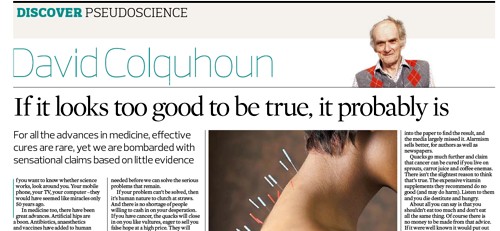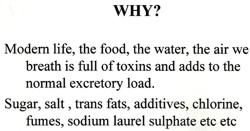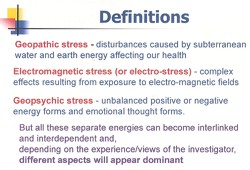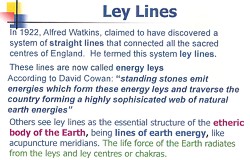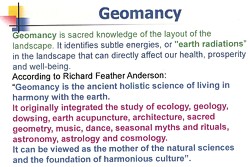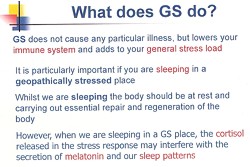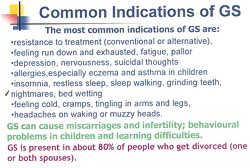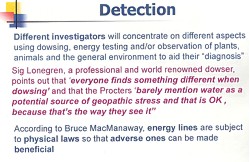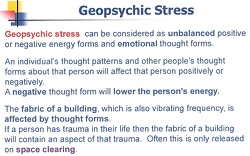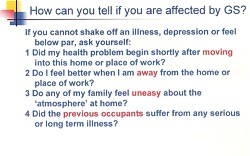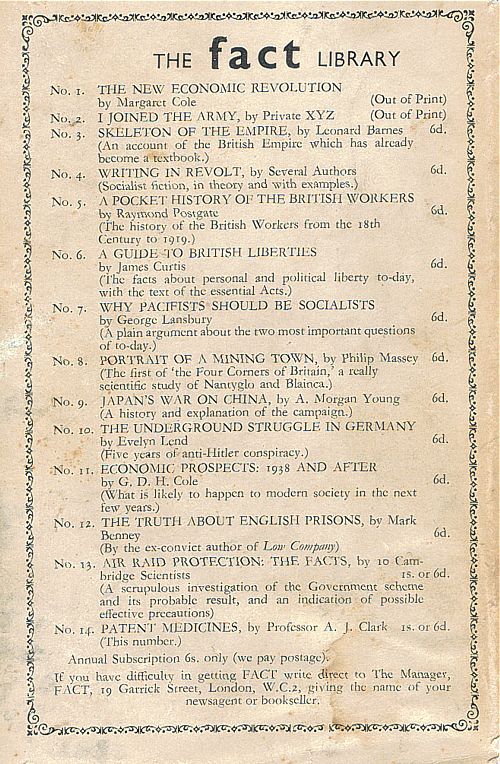conflict of interest
Here is a record of a couple of recent newspaper pieces. Who says the mainstream media don’t matter any longer? Blogs may be in the lead now when it comes to critical analysis. The best blogs have more expertise and more time to read the sources than journalists. But the mainstream media get the message to a different, and much larger, audience.
The Observer ran a whole page interview with me as part of their “Rational Heroes” series. I rather liked their subtitle [pdf of article]
“Professor of pharmacology David Colquhoun is the take-no-prisoners debunker of pseudoscience on his unmissable blog”
It was pretty accurate apart from the fact that the picture was labelled as “DC in his office”. Actually it was taken (at the insistence of the photographer) in Lucia Sivilotti’s lab.
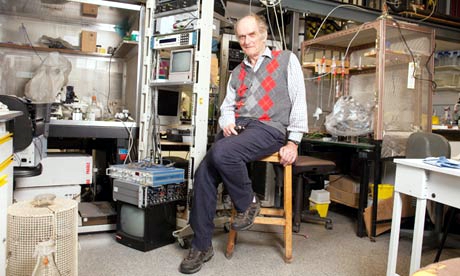
Photo by Karen Robinson.
The astonishing result of this was that on Sunday the blog got a record 24,305 hits. Normally it gets 1,000-1,400 hits a day . between posts, fewer on Sunday, and the previous record was around 7000/day
A week later it was still twice normal. It remains to be seen whether the eventual plateau stays up.
I also gained around 1000 extra followers on twitter, though some dropped away quite soon, and 100 or so people signed for email updates. The dead tree media aren’t yet dead. I’m happy to say.
3 June 2013
Perhaps as a result of the foregoing piece, I got asked to write a column for The Observer, at barely 48 hours notice. This is the best I could manage in the time. The web version has links.
This attracted the usual "it worked for me" anecdotes in the comments, but I spent an afternoon answering them. It seems important to have a dialogue, not just to lecture the public. In fact when I read a regular scientific paper, I now find myself looking for the comment section. That may say something about the future of scientific publishing.
It is for others to judge how succesfully I engage with the public, but I was quite surprised to discover that UCL’s public engagement unit, @UCL_in_public, has blocked me on twitter. Hey ho. They have 1574 follower and I have 7597. I wish them the best of luck.
Follow-up
One of my first posts about nonsense taught in universities was about the University of Westminster (April 2008): Westminster University BSc: “amethysts emit high yin energy”. since then, there have been several more revelations.
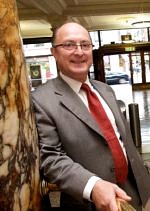 Professor Petts |
The vice-cnancellor of Westminster, Professor Geoffrey Petts, with whom the buck stops, did have an internal review but its report was all hot air and no action resulted (see A letter to the Times, and Progress at Westminster). That earned Professor Petts an appearence in Private Eye Crystal balls. Professor Petts in Private Eye (and it earned me an invitation to a Private Eye lunch, along with Francis Wheen, Charlie Booker, Ken Livingstone . . ). It also earned Petts an appearence in the Guardian (The opposite of science). |
By that time Salford University had closed down all its CAM, and the University of Central Lancashire was running an honest internal review which resulted in closure of (almost) all of their nonsense degrees. But Westminster proved more resistant to sense and, although they closed down homeopathy, they still remain the largest single provider of degrees in junk medicine. See, for example More make-believe from the University of Westminster. This time it’s Naturopathy, and
The last BSc (Hons) Homeopathy closes! But look at what they still teach at Westminster University.
It’s interesting that Westminster always declined to comply with Freedom of Information requests, yet I had more from them than from most places. All the information about what’s taught at Westminster came from leaks from within the university. Westminster has more moles than a suburban garden. They were people with conscience who realised that the university was harming itself. They would claim that they were trying to save the university from some remarkably bad management. I claim also that I’m working in the interests of the university.
In the wake of the victory at the Information Tribunal, I sent a Freedom of Information Act (FOIA) request for for samples of teaching materials from all of their courses. This time they couldn’t legally refuse. The first batch has just arrived, so here are a few selected gems of utter nonsense. Well, it is worse than nonsense because it endangers the health of sick people.
A letter to the university from a student
Before getting on to the slides, here’s a letter that was supplied under FOIA. It was sent anonymously to the university. I was told that this was the only letter of complaint but I happen to know that’s not true so I’ve asked again. This one was forwarded to the vice-chancellor in 2008, and to the review committee. Both seem to have ignored it. Judging from the wording, one would guess that it came from one of their own undergraduates. :Here are some extracts.[download whole letter]
|
It is a flagrant contradiction of a ‘science’ in the BSc to have these practices, but it also jeopardises our profession, which is under DoH review and being constantly attacked in the media Gustifiable I suggest). We are taught that simply tasting plant tinctures can tell us which part of the body they work. on and what they do in the body. We are given printed charts with an outline of the body on to record our findings on. This is both nonsense, but is dangerous as it implies that the pharmacology of plant tinctures can be divined by taste alone. In class we are taught that we can divine the drug actions or use of an unknown plant simply by tasting an alcohol extract. Science? or dangerous fantasy. There are lecturers taking clinics who allow students to dowse and partake themselves in dowsing or pendulums to diagnose and even to test suitability of plant drugs. Dowsing is taught to us by some lecturers and frowned upon by others but we feel it brings the herbal medicine into a poor light as it is unscientific and bogus nonsense. We are concerned that we have seen the course leader brush over this practice as though she is frightened to make a stand. |
The letter seems to refer to a course in herbal medicine. That is a subject that could be studied scientifically, though to do so would leave students unemployed because so few herbal treatments have been shown to work. It obviously is not being studied scientifically: but even teaching students about dowsing and pendulums does not seem to have stirred the vice-chancellor into action.
David Peters: wishful thinking?
David Peters is a nice man. He’s the Clinical Director of Westminster’s School of Integrated Health. I debated with him on the excellent Radio 4 Programme, Material World.
His lecture on "Complementary Healthcare in the NHS" showed some fine wishful thinking.
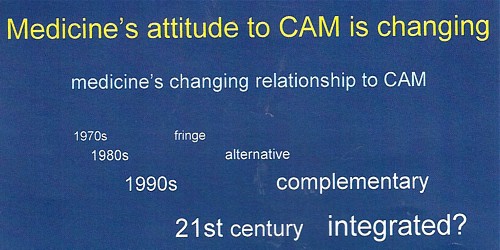
It shows the progress of the euphemisms that quacks use to try to gain respectability, but little else. Interestingly, later slides show a bit more realism.
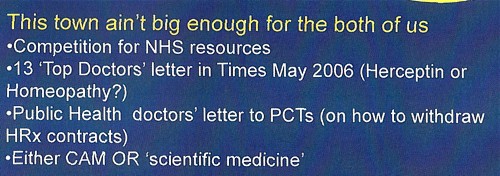
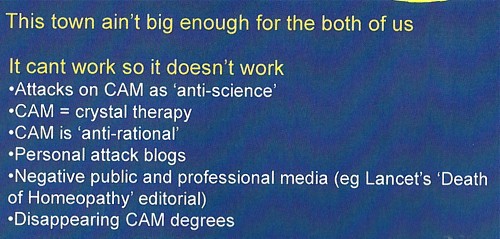
So he has noticed that the tide has turned and that a lot of people are no longer willing to be palmed off with new age gobbledygook. And yes, courses are shutting. Perhaps his course will be the next to shut?
According to an internal Westminster email that found its way to me,
The following courses have been closed/identified for closure due to poor recruitment :
- BSc degrees in Homeopathy and Remedial Massage & Neuromuscular Therapy, students completing by September 2011
- MA degrees in International Community development, Community development and Faith-based Community development, students completing by September 2011
- BSc degree Complementary Medicine
- Graduate diploma BMS
The following courses have been identified as ‘at risk’ (School definition) and will be discussed at the APRG and University Review Group2, due to poor recruitment and high cost of delivery:
- Integrated Health Scheme: BSc Complementary Medicine, Naturopathy; BSc Chinese Medicine; BSc Nutritional Therapy; BSc Herbal Medicine
The BSc (Hons) degree in naturopathy
Naturopathy us pretty bizarre, because it consists largely of doing nothing at all, beyond eating vegetables . Being ill is good for you.
Perhaps the best source to judge claims is the US National Center for Complementary and Alternive Medicine (NCCAM), a branch of the National Institutes of Health. This is the outfit that has spent over a billion dollars of US taxpayers’ money testing alternative medicines and for all that money has not come up with a single useful treatment. They never link to any sort of critical comment, and are nothing if not biassed towards all things alternative. If they can’t come up with evidence. nobody can. Two useful links to NCCAM are Herbs at a glance, and Health Topics A – Z.
Uses of herbal teas in naturopathic dietary care
I was sent a set of over 50 slides on "Herbal Teas/Decoctions (3CMWS03, 1/02, Uses of herbal teas in naturopathic dietary care). About half of them amount to little more than ‘how to make a cup of tea’. but then we get onto uses, but then a lot of fantasy ensues.
What NNCAM says about dandelion. There is no compelling scientific evidence for using dandelion as a treatment for any medical condition.
What Westminster says
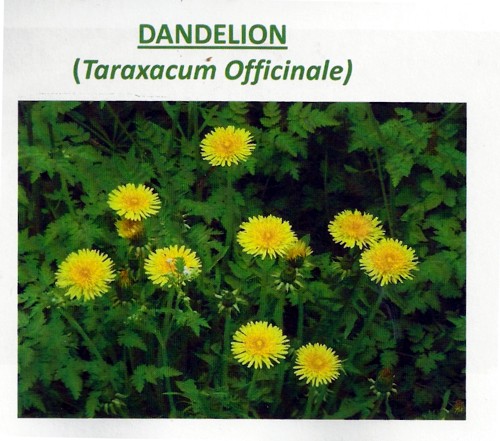
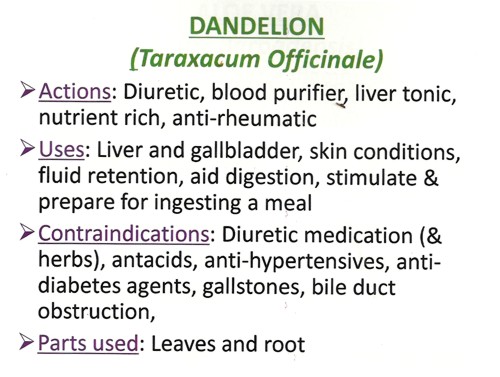
Well I know what a diuretic is, but "blood purifier" and "liver tonic" are meaningless gobbledygook. We’ve been through this before with Red Clover (see Michael Quinion’s .look at the term "blood cleanser"). Using words like them is the very opposite of education.
What NCCAM says.about chamomile: Chamomile has not been well studied in people so there is little evidence to support its use for any condition.
What Westminster says
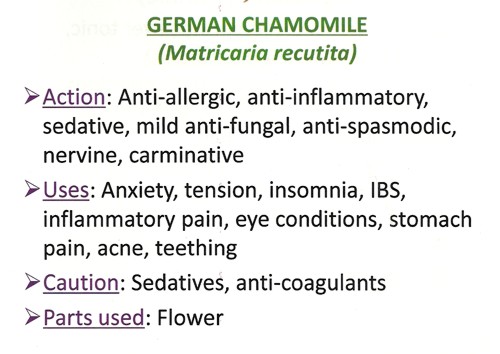
So, judging by NCCAM, these claims are unjustified. It’s teaching folk-lore as though it meant something.
More dangerous advice comes when we get to the ‘repertories’.
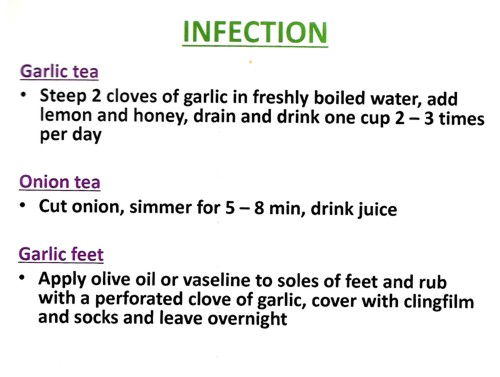
Infections can kill you, They are one of the modest number of things that pharmacology can usually cure, rather than treat symptomatically. If you go to a Westminster-trained naturopath with a serious infection and follow their advice to put garlic in your socks, you will not just be smelly, You could die.
Allergy and Intolerance 3CMwS03 18/02
|
Treating allergies, misdiagnosed by fraudulent tests, is very big business for the ‘health food industry’, This lecture, by R. Newman Turner ND, DO, BAc, started tolerably but descended to a nadir when it mentions, apparently seriously, two of the best known fraudulent methods of allergy diagnosis, the Vega test and "Applied Kinesiology". Kinesiology Sounds sort of sciencey, but Applied Kinesiology is actually a fraudulent and totally ineffective diagnostic method invented by (you guessed) a chiropractor. It has been widely used by alternative medicine to misdiagnose food allergies. It does not work (Garrow, 1988: download reprint). |
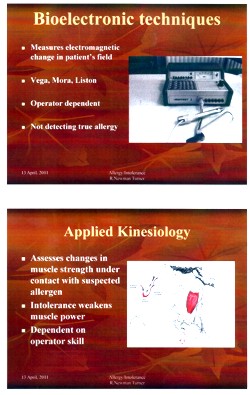
|
Could this be the same R Newman Turner who wrote a book on Naturopathic First Aid? The mind boggles.
Naturopathic Detoxification 23 CMES03 25/02 Detox Myth of Fact
|
This lecture was the responsibility of Irving S Boxer ND DO MRN LCH, a naturopath, homeopath and osteopath in private practice. Don’t be fooled by the implied question in the title. It might have been taken to suggest a critical approach. Think again. There is all the usual make-believe about unspecified and imaginary toxins that you must get rid of with enemas and vegetables. |
|
|
The skin brushing does not quite plumb the depths of Jacqueline Young’s Taking an air bath , but presumably it is something similar. "Liver activation" by castor oil packs is pure unadulterated gobblydygook. The words mean nothing. Their attempt to divide all foods into those that cleanse and those that clog sounds reminiscent of the Daily Mail’s ontological oncology project. |
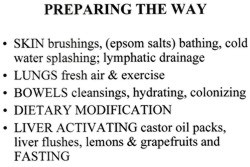 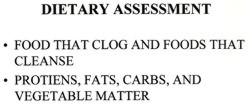
|
The practice of healing (3CMSS01 2/12)
Next we retreat still further into fantasy land
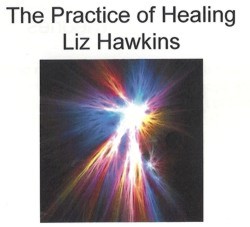
|
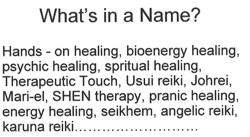
|
All pure hokum, of course’ She could have added "craniosacral therapy" (at present the subject of a complaint against the UCL Hospitals Trust (that’s the NHS, not UCL) to the Advertising Standards Authority,
 |
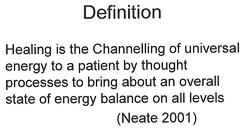 |
Is that definition quite clear?
In fact this sort of nonsense about rays coming from your hands was disproved experimentally, in a rather famous paper, the only paper in the Journal of the American Medical Association to have been written by a 9-year old. Emily Rosa. She (with some help from her parents) devised a simple test for her 4th (US) grade science fair project. It was later repeated under more controlled conditions and written up for JAMA [download reprint] . It showed that the claims of ‘therapeutic touch" practitioners to be able to detect "auras" were totally false. No subsequent work has shown otherwise. Why, then, does the University of Westminster teach it as part of a Bachelor of Science degree?
You can see Emily Rosa herself explain why “therapeutic touch is bullshit” with Penn and Teller, in Penn and Teller Expose Therapeutic Touch.
Environmental stress
The last bit of hokum (for the moment) is one of the best. This one has every myth under the sun (including some I hadn’t heard of).
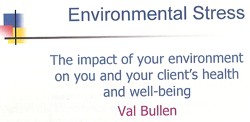
|
The lecturer, Val Bullen, was also responsible for the infamous "Amethysts emit high Yin energy" slide. One of her own students desribes her as "sweet but deluded". I have nothing against Ms Bullen, She can believe whatever she wants. My problem is with the vice-chancellor, Prof Geoffrey Petts, who seems to think that this sort of stuff is appropriate for a BSc. |
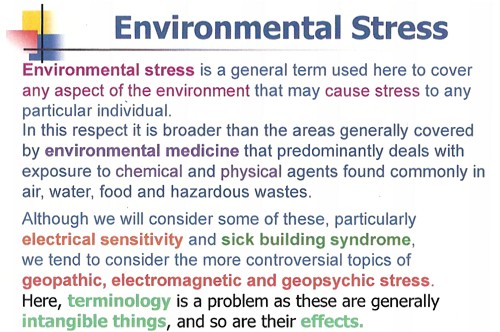
|
Everything barmy is here. Mobile phones, power lines, underwater streams, ley lines, sick building syndrome, are all reasons why you don’t feel 100 percent, Actually my reason is having to read this junk. The "definitions" are, as always, just meaningless words.
|
But don’t despair. Help is at hand.
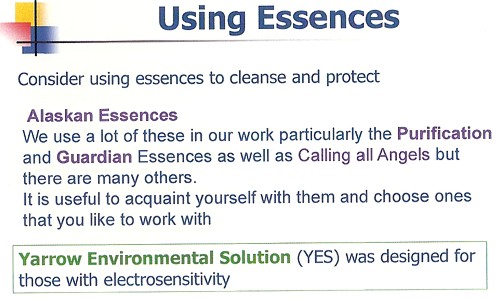
Just in case you happen to have run out of Alaskan Calling All Angels Essence, you can buy it from Baldwin’s for £19.95. It’s "designed to invoke the nurturing, uplifting and joyful qualities of the angelic kingdom.", and what’s more "can also use them any time to cleanse, energize, and protect your auric field." Well that’s what it says.in the ad.
Yarrow Environmental Solution looks like good stuff too. Only £7.95 for 7.5 ml. For that you get a lot. It will
" . . strengthen and protect against toxic environmental influences, geopathic stress, and other hazards of technology-dominated modern life. This includes the disruptive effects of radiation on human energy fields from X-rays, televisions, computer monitors, electromagnetic fields, airplane flights or nuclear fall-out."
OK stop giggling. This is serious stuff, taught in a UK university as part of a BSc degree, and awarded a high score by the Quality Assurance Agency (QAA).
Professor Petts, are you listening? I believe it is you, not I, who is bringing your university into disrepute.
The slides shown here are copyright of the University of Westminster or of the author of the lecture. They are small sample of what I was sent and are reproduced under the “fair quotation” provision, in the public interest.
Follow-up
5 May 2011. By sheer coincidence, Emily and Linda Rosa were passing through London. They called for lunch and here’s a picture (with Ben Goldacre) in UCL’s (endangered) Housman room. Linda kindly gave me a copy of her book Attachment Therapy on Trial: The Torture and Death of Candace Newmaker. [Download reprint of Rosa’s paper..]
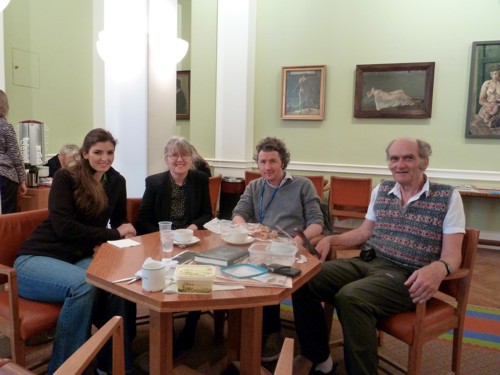
.
6 May 2011. Talking of the “vibrational medicine” fantasy, I had an email that pointed out a site that plumbs new depths in fantasy physics. It’s on the PositiveHealthOnline website: A post there, Spirals and Energy in Nature, was written by Robert McCoy. He claims to have worked on microprocessor layout design, but anyone with school physics could tell that the article is sheer nonsense. In a way it is much more objectionable that the silly slides with coloured rays used in the Westminster course. McCoy’s post seeks to blind with sciencey-sounding language, that in fact makea no sense at all. Luckily my retweet of the site attracted the attention of a real physicist, A.P. Gaylard, who made a very welcome return to blogging with Fantasy physics and energy medicine. He dismantles the physics, line-by-line, in a devastating critique. This sort of junk physics is far more dangerous than the perpetual motion pundits and the cold-fusion fantasists. At PositiveHealthOnline it is being used to push pills that do you no good and may harm you. It is a danger to public health.
In July 2008 I wrote an editorial in the New Zealand Medical Journal (NZMJ), at the request of its editor.
The title was Dr Who? deception by chiropractors. It was not very flattering and it resulted in a letter from lawyers representing the New Zealand Chiropractic Association. Luckily the editor of the NZMJ, Frank Frizelle, is a man of principle, and the legal action was averted. It also resulted in some interesting discussions with disillusioned chiropractors that confirmed one’s worst fears. Not to mention revealing the internecine warfare between one chiropractor and another.
This all occurred before the British Chiropractic Association sued Simon Singh for defamation. The strength of the reaction to that foolhardy action now has chiropractors wondering if they can survive at all. The baselessness of most of their claims has been exposed as never before. No wonder they are running scared. The whole basis of their business is imploding.
Needless to say chiropractors were very cross indeed. Then in February 2009 I had a polite email from a New Zealand chiropractor, David Owen, asking for help to find one of the references in the editorial. I’d quoted Preston Long as saying
"Long (2004)7 said “the public should be informed that chiropractic manipulation is the number one reason for people suffering stroke under the age of 45.”
And I’d given the reference as
7. Long PH. Stroke and spinal manipulation. J Quality Health Care. 2004;3:8–10
I’d found the quotation, and the reference, in Ernst’s 2005 article, The value of Chiropractic, but at the time I couldn’t find the Journal of Quality Healthcare. I did find the same article on the web. At least the article had the same title, the same author and the same quotation. But after finding, and reading, the article, I neglected to change the reference from J Quality Health Care to http://skepticreport.com/sr/?p=88. I should have done so and for that I apologise.
When I asked Ernst about the Journal of Quality Healthcare, he couldn’t find his copy of the Journal either, but he and his secretary embarked on a hunt for it, and eventually it was found.

![]()
|
It turns out that Journal of Quality Healthcare shut down in 2004, without leaving a trace on the web, or even in the British Library. It was replaced by a different journal, Patient Safety and Quality Healthcare (PSQH) A reprint was obtained from them. It is indeed the same as the web version that I’d read, and it highlighted the quotation in question. The reprint of the original article, which proved so hard to find, can be downloaded here. |
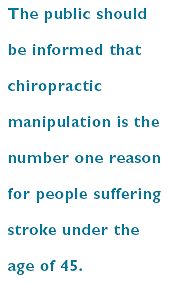
|
The full quotation is this
"Sixty-two clinical neurologists from across Canada, all certified members of the Royal College of Physicians and Surgeons, issued a warning to the Canadian public, which was reported by Brad Stewart, MD. The warning was entitled Canadian Neurologists Warn Against Neck Manipulation. The final conclusion was that endless non-scientific claims are being made as to the uses of neck manipulation(Stewart, 2003). They need to be stopped. The public should be informed that chiropractic manipulation is the number one reason for people suffering stroke under the age of 45."
I have often condemned the practice of citing papers without reading them (it is, of course, distressingly common), so I feel bad about this, though I had in fact read the paper in question in its web version. I’m writing about it because I feel one should be open about mistakes, even small ones.
I’m also writing about it because one small section of the magic medicine community seems to think they have nailed me because of it. David Owen, the New Zealand chiropractor, wrote to the editor of the NZMJ, thus.
|
The quote [in question] is the public should be informed that chiropractic manipulation is the number one reason for people suffering stroke under the age of 45. Long PH. Stroke and Manipulation. J Quality Health Care. 2004:3:8-10 This quote actually comes from the following blog article http://www.skepticreport.com/medicalquackery/strokespinal.htm [DC the URL is now http://skepticreport.com/sr/?p=88] I have attached all my personal communications with Colquhoun. They demonstrate this is not a citation error. Prof Colquhoun believes the origin of the quote doesn’t matter because Long was quoting from a Canadian Neurologists’ report (this is also incorrect). As you can see he fails to provide any evidence at all to support the existance [sic] of the “J Quality Health Care.” Colquhoun ‘s belief that my forwarding this complaint is me “resorting to threats” is the final nail in the coffin. If he had any leg to stand on where is the threat? This may seem pedantic but it surely reflects a serious ethical breach. Is it acceptable to make up a reference to try and slip any unsupported statement into a “scientific” argument and thereby give it some degree of credibility? Incidentally, at the end of the article, conflicts of interest are listed as none. As Colquhoun is a Professor of Pharmacology and much of his research funding no doubt comes from the pharmaceutical industry how can he have no conflict of interest with therapies that do not advocate the use of drugs and compete directly against the billions spent on pain medications each year? If I may quote Colquhoun himself in his defence of his article (Journal of the New Zealand Medical Association, 05-September-2008, Vol 121 No 1281) I’ll admit, though, that perhaps ‘intellect’ is not what’s deficient in this case, but rather honesty. David Owen |
Financial interests
Well, here is a threat: I’m exposed as a shill of Big Pharma. ". . . much of his funding no doubt comes from the pharmaceutical industry". I can’t count how many times this accusation has been thrown at me by advocates of magic medicine. Oddly enough none of them has actually taken the trouble to find out where my research funding has come from. None of them even knows enough about the business to realise the extreme improbability that the Pharmaceutical Industry would be interested in funding basic work on the stochastic properties of single molecules. They fund only clinicians who can help to improve their profits,
The matter of funding is already on record, but I’ll repeat it now. The media ‘nutritional therapist’, Patrick Holford, said, in the British Medical Journal
“I notice that Professor David Colquhoun has so far not felt it relevant to mention his own competing interests and financial involvements with the pharmaceutical industry “
To which my reply was
” Oh dear, Patrick Holford really should check before saying things like “I notice that Professor David Colquhoun has so far not felt it relevant to mention his own competing interests and financial involvements with the pharmaceutical industry”. Unlike Holford, when I said “no competing interests”, I meant it. My research has never been funded by the drug industry, but always by the Medical Research Council or by the Wellcome Trust. Neither have I accepted hospitality or travel to conferences from them. That is because I would never want to run the risk of judgements being clouded by money. The only time I have ever taken money from industry is in the form of modest fees that I got for giving a series of lectures on the basic mathematical principles of drug-receptor interaction, a few years ago.”
I spend a lot of my spare time, and a bit of my own money, in an attempt to bring some sense into the arguments. The alternative medicine gurus make their livings (in some cases large fortunes) out of their wares.
So who has the vested interest?
Does chiropractic actually cause stroke?
As in the case of drugs and diet, it is remarkably difficult to be sure about causality. A patient suffers a vertebral artery dissection shortly after visiting a chiropractor, but did the neck manipulation cause the stroke? Or did it precipitate the stroke in somebody predisposed to one? Or is the timing just coincidence and the stroke would have happened anyway? There has been a lot of discussion about this and a forthcoming analysis will tackle the problem of causality head-on,
My assessment at the moment, for what it’s worth, is that there are some pretty good reasons to suspect that neck manipulation can be dangerous, but it seems that serious damage is rare.
In a sense, it really doesn’t matter much anyway, because it is now apparent that chiropractic is pretty well discredited without having to resort to arguments about rare (though serious) effects. There is real doubt about whether it is even any good for back pain (see Cochrane review), and good reason to think that the very common claims of chiropractors to be able to cure infant colic, asthma and so on are entirely, ahem, bogus. (See also Steven Novella, ebm-first, and innumerable other recent analyses.)
Chiropractic is entirely discredited, whether or not it may occasionally kill people.
Complaint sent to UCL
I had an enquiry about this problem also from my old friend George Lewith. I told him what had happened. Soon after this, a complaint was sent to Tim Perry and Jason Clarke, UCL’s Director and Deputy Director of Academic Services. The letter came not from Lewith or Owen, but from Lionel Milgom. Milgrom is well known in the magic medicine community for writing papers about how homeopathy can be “explained” by quantum entanglement. Unfortunately for him, his papers have been read by some real physicists and they are no more than rather pretentious metaphors. See, for example, Danny Chrastina’s analysis, and shpalman, here. Not to mention Lewis, AP Gaylard and Orac.
|
Dear Mr Perry and Mr Clark, I would like to bring to your attention an editorial (below) that appeared in the most recent issue of the New Zealand Medical Journal. In it, one of your Emeritus Professors, David Colquhoun, is accused of a serious ethical breach, and I quote – “Is it acceptable to make up a reference to try and slip any unsupported statement into a “scientific” argument and thereby give it some degree of credibility?” Professor Colquhoun is well-known for writing extensively and publicly excoriating many forms of complementary and alternative medicine, particularly with regard to the alleged unscientific nature and unethical behaviour of its practitioners. Professor Colquhoun is also a voluble champion for keeping the libel laws out of science. While such activities are doubtlessly in accord with the venerable Benthamite liberal traditions of UCL, I am quite certain hypocrisy is not. And though Professor Colquhoun has owned up to his error, as the NZMJ’s editor implies, it leaves a question mark over his credibility. As custodians of the college’s academic quality therefore, you might care to consider the possible damage to UCL’s reputation of perceived professorial cant; emeritus or otherwise. Yours Sincerely Dr Lionel R Milgrom |
So, as we have seen, the quotation was correct, the reference was correct, and I’d read the article from which it came I made a mistake in citing the original paper rather than the web version of the same paper..
I leave it to the reader to judge whether this constitutes a "serious ethical breach", whether I’d slipped in an "unsupported statement", and whether it constitutes "hypocrisy"
Follow-up
It so happens that no sooner was this posted than there appeared Part 2 of the devastating refutation of Lionel Milgrom’s attempt to defend homeopathy, written by AP Gaylard. Thanks to Mojo (comment #2) for pointing this out.
The much-delayed public consultation on the Pittilo report has just opened.
It is very important that as many people as possible respond to it. It’s easy to say that the consultation is sham. It will be if it is left only to acupuncturists and Chinese medicine people to respond to it. Please write to them before the closing date, November 2nd 2009. The way to send your evidence is here.
There is a questionnaire that you can complete, with the usual leading questions. Best do it anyway, but I’d suggest also sending written evidence as attachment too. I just got from DoH the email address where you can send it. They said
| if you have material you wish to send which you can’t easily “shoehorn” into the questionnaire, please send it to the following mailbox:
HRDListening@dh.gsi.gov.uk |
Here are three documents that I propose to submit in response to the consultation.I ‘d welcome criticisms that might make it more convincing. Use any parts of them you want in your own response.
- Submission to the Department of Health, for the consultation on the Pittilo report [download pdf].
- What is taught in degrees in herbal and traditional Chinese medicine? [download pdf]
- $2.5B Spent, No Alternative Med Cures [download pdf]
|
I’ve written quite a lot about the Pittilo report already, in particular A very bad report: gamma minus for the vice-chancellor, and in The Times (see also the blog version).
Intriguingly, these posts are at number 2 in a Google search for “Michael Pittilo”. |
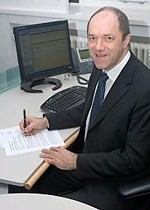 |
Briefly, the back story is this.
It is now over a year since the Report to Ministers from “The Department of Health Steering Group on the Statutory Regulation of Practitioners of Acupuncture, Herbal Medicine, Traditional Chinese Medicine and Other Traditional Medicine Systems Practised in the UK” [download the report].
The chair of the steering group was Professor R. Michael Pittilo, Principal and Vice-Chancellor of The Robert Gordon University, Aberdeen. The reason thet the report is so disastrously bad in its assessment of evidence is that it was written entirely by people with vested interests.
The committee consisted of five acupuncturists, five herbalists and five representatives of traditional Chinese medicine (plus eleven observers). There was not a single scientist or statistician to help in the assessment of evidence. And it shows: The assessment of the evidence in the report was execrable. Every one of the committee members would have found themselves out of work if they had come to any conclusion other than that their treatment works, Disgracefully, these interests were not declared in the report, though they are not hard to find. The university of which the chair is vice-chancellor runs a course in homeopathy, the most discredited of the popular forms of alternative medicine. That tells you all you need to know about the critical faculties of Michael Pittilo.
The two main recommendations of this Pittilo report are that
- Practitioners of Acupuncture, Herbal Medicine, Traditional Chinese Medicine should be subject to statutory regulation by the Health Professions Council
- Entry to the register normally be through a Bachelor degree with Honours
Let’s consider the virtue of these two recommendations.
Regulation by the Health Professions Council (HPC) breaks their own rules
For a start, this should be ruled out by the HPC’s own rules, which require “Practise based on evidence of efficacy” as a condition for registration. Since there is practically no “evidence of efficacy”, it follows that the HPC can’t regulate acupuncture, herbal and Chinese medicine as Pittilo recommends. Or so you’d think. But the official mind seems to have an infinite capacity for doublespeak. The HPC published a report on 11 September 2008, Regulation of Medical Herbalists, Acupuncturists and Traditional Chinese Medicine Practitioners.
The report says
1. Medical herbalists, acupuncturists and traditional Chinese medicine practitioners should be statutorily regulated in the public interest and for public safety reasons.
2. The Health Professions Council is appropriate as the regulator for these professions.
3. The accepted evidence of efficacy overall for these professions is limited, but regulation should proceed because it is in the public interest.
In other words, the HPC simply decided to ignore its own rules, Its excuse for doing so is that regulation would protect “public safety” . But it simply would not do that. It is ell known that some Chinese herbs are adulterated with dangerous substances, but laws against that already exist. Trading Standards are much more likely to take appropriate action than the HPC. The Medicines and Health Regulatory Authority (MHRA) already deals with the licensing of herbal medicines. and, despite the fact that it recently betrayed its trust by allowing them to be labelled in a misleading way, they are the people to do it, not the HPC.
The Pittilo report (page 11) says
In future, it is hoped that more Government funding can be allocated to research into traditional/herbal medicines and acupuncture and that grants will become available to encourage practitioners to undertake postgraduate research work.
So they are asking for more government money.
In March 2007, the Chinese Government pledged to spend over $130 million over the next five years on research into the effectiveness of traditional Chinese medicine. It is to be hoped that this money will be targeted effectively to evaluate TCM.
It seems to have escaped the notice of Pittilo that roughly 100 percent of trials of Chinese medicine done in China come out positive. Elsewhere, very few come out positive,(see Vickers et al., 1998, Controlled Clinical Trials, 19, 159-166: download reprint) The Department of Health would be unwise to rely on Chinese research. Remember that modern acupuncture was not so much a product of ancient wisdom, but rather it stems from nationalist propaganda by Mao Tse-Tung, who needed a cheap way to keep the peasants quiet, though he was too sensible to use it himself.
The HPC report (page 5) cites these with the words
” . . . a lack of evidence of efficacy should not prevent regulation but that the professions should be encouraged and funded to strengthen the evidence base.”
This sentence seems to assume that the outcomes of research will be to strengthen the evidence base. Thus far, precisely the opposite has been the case. The Pittilo group has apparently not noticed that the US National Institutes of Health has already spent a billion dollars on research in alternative medicine and failed to come up with a single effective treatment. There are better ways to spend money on health. See, for example $2.5B Spent, No Alternative Med Cures found. .An enornous amount of research has already been done and the outcomes have produced no good treatments,
The proposed regulation would endanger the public, not protect it.
The excuse given by the HPC for breaking its own rules is that it should do so to protect the public.
Likewise Ann Keen, Health Minister, said:
“Patient safety is paramount, whether people are accessing orthodox health service treatments or using alternative treatments”
So first we need to identify what dangers are posed by acupuncture, herbal medicine and traditional Chinese medicine.
- Acupuncture is fairly safe. Its biggest danger lies in the unjustified claims that are routinely made for what can be achieved by being impaled by needles. This poses a danger that people may use acupuncture in place of treatments that work
- Herbal medicines are unstandardised, so even the very few that may work are dangerous to patients because the dose of active principle is unknown and varies from one batch to another. Taking a herbal medicine is a bit like swallowing a random number of tablets, False health claims pose a danger to patients too, when they cause patients to avoid treatments that work.
- Traditional Chinese Medicine is probably the most dangerous. Like the other two, the medicines are unstandardised so the dose is never known. False health claims abound. And in addition to these dangers, many cases have been found of Chinese medicines being adulterated with poisonous substances or with conventional drugs.
The form of regulation proposed by Pittilo would do little or nothing to protect the public from any of these dangers.
The proposals accept the herbal and Chinese medicine as traditionally practised. Nothing would be done about one of the major dangers, the lack of standardisation. That is a problem that was solved by pharmacologists in the 1930s, when international standards were set for the biological activity of things like tincture of digitalis, and assays were devised so that different batches could be adjusted to the same potency. Now, 80 years later, it is being proposed by Pittilo that we should return to the standards of safety that existed at the beginning of the last century. That is a threat to public safety., but the proposed regulation would do nothing whatsoever to protect the public from this dangerous practice. On the contrary, it would give official government sanction to it.
The other major danger is that patients are deceived by false health claims. This is dangerous (as well as dishonest) because it can cause patients to avoid treatments that work better, The internet abounds with claims that herbs can cure anything from diabetes to cancer. Many are doubtless illegal, but regulators like the HPC have traditionally ignored such claims: they are left to Trading Standards, Advertising Standards and the Medicines and Health Regulatory Authority (MHRA) to deal with. The MHRA already also has responsibility for monitoring side effects. The HPC would not do this.
The analogy with chiropractic and the GCC
The foolishness of allowing statutory regulation for unproven treatments has recently been illustrated quite dramatically by the case of chiropractic. Chiropractors have had statutory regulation by the General Chiropractic Council, which was established by the Chiropractors Act of 1994. The British Chiropractic Association (BCA) recently decided to sue the science writer, Simon Singh, for defamation when he cast doubt on some of the claims made by chiropractors, in particular their claims to be able to cure colic and asthma in children. That led to close examination of the claims. In fact there is no reason to think that spinal manipulation works for asthma, or that it works for colic. In fact there is quite good evidence that the claims are false. The result was that about 600 well-justified complaints have been lodged with the GCC (enough to bankrupt the GCC if the complaints are dealt with properly).
The point of this story is that the statutory regulator had nothing whatsoever to prevent these false health claims being made. Two of the complaints concern practices run by the chair of the GCC. Worse, the GCC actually endorsed such claims. The statutory regulator saw its duty to defend chiropractic (apart from a handful of cases of sexual misdemeanours), not to protect the patient from false health claims. The respectability conferred by statutory regulation made false health claims easier and endangered the public. It would be a disaster if the same mistake were made again.
On 11th December 2008 I got a letter form the HPC which said
in our opinion a lack of evidence of efficacy would not impede our ability to set standards or deal with complaints we receive. The vast majority of cases we consider are related to conduct.
But perhaps that is because they haven’t tried “regulating” quacks before. Now that the public is far more conscious about health fraud than it used to be, one can predict confidently that the HPC would be similarly overwhelmed by a deluge of complaints about the unjustified health claims made by acupuncturists, herbal medicine and traditional Chinese medicine practitioners. There is no shortage of them to complain about.
The education problem
The Pittilo report recommends that the entry level for registration should be a bachelors degree with honours. At first sight it seems reasonable to ask that practitioners should be ‘properly qualified’, but when one looks at what is actually taught on these degrees it becomes clear that they endanger, rather than protect, the public,
There are two very big problems with this recommendation.
Firstly, you can’t have a bachelors degree with honours until after you have decided whether or not there is anything useful to teach. If and when any of the subjects under consideration and shown to work to a useful extent, then it would be quite reasonable to establish degrees in them. Even the report does not pretend seriously that that stage has been reached. The proposal to set up degrees in subjects, at least some of which are quite likely to have no more than placebo value, is self-evidently nonsense,
The time for degrees, and the time for government endorsement by statutory regulation, is after the therapies have been shown to work, not before.
The absurdity of thinking that the public will be protected because a practitioner has a degree in, say, acupuncture, is shown with startling clarity by a recently revealed examination paper in acupuncture’
You can download the entire exam paper. Here are a few highlights from it.

So students, in 2009, are being taught the crudest form of vitalism.
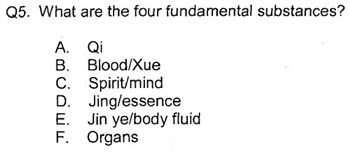
Teaching of traditional Chinese medicine is just as bad. Here are two slides from a course run by the University of Westminster.
The first ‘explains’ the mysterious and entirly mythical “Qi”.
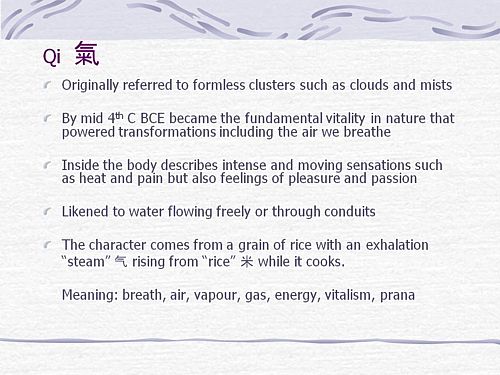
So “Qi” means breath, air, vapour, gas, energy, vitalism. This is meaningless nonsense.
The second slide shows the real dangers posed by the way Chinese medicine is taught, The symptoms listed at the top could easily be a clue to serious illness, yat students are taught to treat them with ginger. Degrees like this endanger the public.
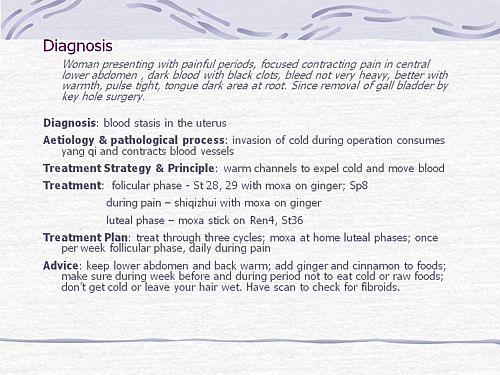
There are more mind-boggling slides from lectures on Chinese medicine and cancer: they show that what students are being taught is terrifyingly dangerous to patients.
It is entirely unacceptable that students are being taught these ancient myths as though they were true, and being encouraged to treat sick people on their basis. The effect of the Pittilo recommendations would be to force new generations of students to have this sort of thing forced on them. In fact the course for which this exam was set has already closed its doors. That is the right thing to do.
Here’s another example. The course leader for “BSc (Hons) Herbal Medicine” at the Univsrsity of Central Lancashire is Graeme Tobyn BA. But Tobyn is not only a herbalist but also an astrologer. In an interview he said
“At the end I asked her if I could cast her horoscope. She threw up her hands and said, ‘I knew this would happen if I came to an alternative practitioner.”
“I think the ruler of the ascendant was applying to Uranus in the ninth house, which was very pertinent.”
This would be preposterous even in the life style section of a downmarket women’s magazine, The Pittilo report wants to make degrees run my people like this compulsory. Luckily the Univerity of Central Lancashire is much more sensible and the course is being closed.
The matter is, in any case, being taken out of the hands of the government by the fact that universities are closing degrees in complementary medicine, including courses in some of those under discussion here, The University of Salford and the University of Central Lancashire have recently announced the closure of all the degree programmes in complementary and alternative medicine. The largest provider of such degrees, the University of Westminster has already shut down two of them, and the rest are being assessed at the moment. It is likely that the rest will be closed in the future.
The revelation that Westminster had been teaching its first year students that “amethysts emit high yin energy” and that students had been taught to diagnose disease and choose treatments by means of a dowsing pendulum, showed very clearly the sort of utter nonsense that undergraduates were being forced to learn to get a ‘bachelors degree with honours’. It stretches credulity to its limits to imagine that the public is protected by degrees like this. Precisely the opposite is true. The universities have recognised this, and shut the degrees. One exception is Professor Pittilo’s own university which continues to run a course in homeopathy, the most discredited of all the popular types alternative medicine.
A simpler, more effective and cheaper way to protect the public
I must certainly agree with the minister that protection of the public is an important matter. Having established that the Pittllo recommendations are more likely to endanger the public than protect them, it is essential to suggest alternative proposals that would work better.
Luckily, that is easy, because mechanisms already exist for dealing with the dangers that were listed above. The matter of adulteration, which is serious in traditional Chinese medicine, is a matter that is already the responsibility of the Office of Trading Standards. The major problem of false claims being made for treatment is also the responsibility of the Office of Trading Standards, which has a statutory duty to enforce the Unfair Trading Consumer Protection Regulations of May 2008. These laws state, for example, that
“One of the 31 commercial practices which are in all circumstances considered unfair is “falsely claiming that a product is able to cure illnesses, dysfunction or malformations”
The monitoring of false claims, and of side effects of treatments, is also the responsibility of the Medicines and Health Regulatory Authority (MHRA).
Rather than setting up complicated, expensive and ineffective ‘regulation’ by the HPC, all that need to be done is to ensure that the MHRA and/or Trading Standards have the funds to enforce existing laws. At the moment, they are not being implemented effectively, so I’d recommend that responsibility for enforcing the law against false health claims be transferred entirely to the MHRA, which has much more expertise in such matters than Trading Standards This would be both cheaper and more effective than the present system in which the responsibility is divided between the two organisations in an unclear way.
This proposal would protect the public against unsafe and adulterated treatments, and it would protect the public against false and fraudulent claims. That is what matters. It would do so more effectively,
more cheaply and more honestly than the Pittilo recommendations. There would be no reduction in patient choice either, There is no proposal to ban acupuncture, herbal medicine or traditional Chinese medicine. All that is necessary is to ensure that they don’t endanger the public.
Since the root of the problem lies in the fact that the evidence for the effectiveness is very weak. the question of efficacy, and cost-benefit ratio, should be referred to NICE. This was recommended by the House of Lords Report (2000). It is recommended again by the Smallwood report (sponsored by the Prince of Wales Foundation). It is baffling that this has not been done already. It does not seem wise to spend large amounts of money on new research at the moment, in the light of the fact that the US National Institutes of Health has already spent over $1 billion on such research without finding a single useful treatment.
The results of all this research has been to show that hardly any alternative treatment are effective. That cannot be ignored.
Conclusion
Recent events show that the halcyon days for alternative medicine are over. When the Pittilo report first appeared, it was greeted with derision in the media. For example, in The Times Alice Miles wrote
“This week came the publication of the Report to Ministers from the Department of Health Steering Group on the Statutory Regulation of Practitioners of Acupuncture, Herbal Medicine, Traditional Chinese Medicine and Other Traditional Medicine Systems Practised in the UK. Otherwise known as twaddle.”
In the Independent, Dominic Lawson wrote
So now we will have degrees in quackery.
What, really, is the difference between acupuncture and psychic surgery?
People will no doubt continue to use it and that is their right and their responsibility. But if the government were to accept the recommendations of the Pittilo report it would be seen, quite rightly, as being anti-scientific and of posing a danger to the public.
Fortunately there is a better, and cheaper, way to protect the public.
Follow-up
Margaret McCartney’s blog in the Financial Times puts rhw view of a GP with her usual sense, humour and incisiveness.
“This report would, if implemented, create lots more nonsense exam papers funded by a lot more public money – and would produce practitioners without the absolutely crucial skill of how to assess evidence and reject or use it appropriately”
The Times has covered the story (with some interesting comments) Consultation on how to regulate complementary and alternative therapies
Times Higher Education UK-wide consultation on CAM regulation is launched Excellent response from Andy Lewis.
The Sun has by far the best coverage up to now, Jane Symons writes “Regulating quacks helps them prey on gullible patients“
Herbal medicine is, unlike homeopathy, not ridiculous, It is merely Pharmacology, as practised up to circa 1900. Whereas good trials have now shown acupuncture to be sham and homeopathy to be a placebo, there has been very little good research on herbs.
Most herbalism could fairly be described giving to sick patients an unknown dose of a substance with unknown efficacy and unknown safety.
How odd, then, to visit the Royal Society of Medicine to be greeted thus.
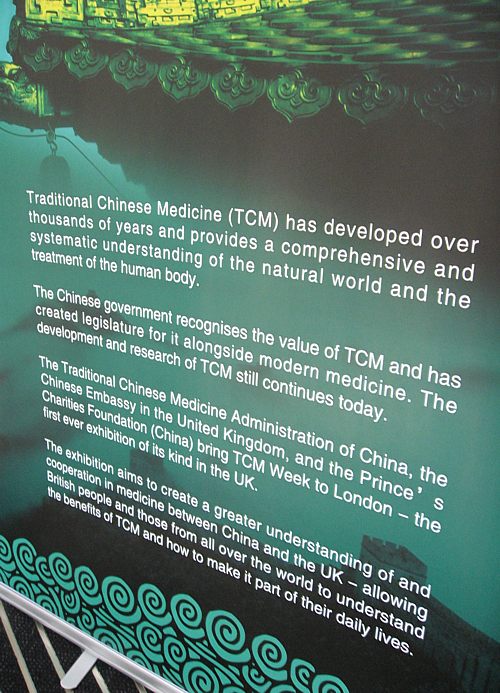
Just look at the words!
“Traditional Chinese Medicine (TCM) has developed over thousands of years”
That’s partly true
“and provides a comprehensive and systematic understanding of the natural world and the treatment of the human body.”
and that is total nonsense. TCM provides no understanding and virtually none of it is known to be useful for treating anything.
| Another poster at the RSM exhibition provides some of the explanation. What on earth, one wonders, do they mean by “making efforts to modernise TCM “? So far, the idea of modernising TCM doesn’t seem to include any great effort to find out if it works. Much of the promotion of TCM seems to be not so much ‘ancient wisdom’, but modern nationalist propaganda by the Chinese government. |
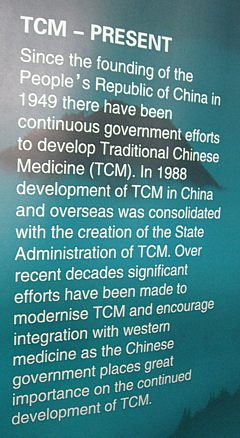 |
The history is fascinating, but you won’t learn it from the posters on display at the exhibition.
“The Daoguang emperor though it [acupuncture] was a barrier to medical progress and removed it from the curriculum of the Imperial Medical Institute,”
“By the start of the twentieth century, acupuncture was extinct in the West and dormant in the East. It might have fallen out of favour permanently, but it suddenly experienced a revival in 1949 as a direct result of the communist revolution and the establishment of the People’s Republic of China. Chairman Mao Tse-tung engineered a resurgence in traditional Chinese medicine, which included not just acupuncture but also Chinese herbal medicine and other therapies ”
“His motivation was partly ideological, inasmuch as he wanted to reinforce a sense of national pride in Chinese medicine. However he was also driven by necessity. He had promised to deliver affordable healthcare .. . . ”
“Mao did not care whether traditional Chinese medicine worked, as long as he could keep the masses contented. In fact, his personal physician, Zhisui Li, wrote a memoir entitled ‘The Private Life of Chairman Mao’, in which he quoted Mao as saying”
“Even though I believe we should promote Chinese medicine, I personally do not believe in it. I don’t take Chinese medicine.” “
Singh & Ernst Trick or Treatmant, page 46.
Or, as put more succinctly by Shapiro
“You would never know that TCM was fashioned in the twentieth century, as we shall see, from a ragbag of therapies in post-revolutionary China.”
Rose Shapiro, Suckers, how alternative medicine makes fools of us all.
Why is the Royal Society of Medicine allowing such mendacious posters? As it happens, I and a friend were visiting the RSM to see their Academic Dean, with a view to finding out why the RSM had failed to take any public position on alternative medicine. The answer appeared to be money, and that was the answer to why the TCM exhibition was being held on their premises too. The Dean no more believed in TCM than we did, but, well, they need the income. He pointed out (looking suitably sheepish) that the address given for the exhibition was not the RSM, but Number 1 Wimpole Street (that, of course, is also the address of the RSM).
Ah, so that’s OK then.
It has to be said that the RSM isn’t alone in its spineless attitude. Both the British Medical Association (BMA) and the Royal College of General Practitioners (RCGP) have failed to make any clear condemnation of mystical medicine. This is in stark contrast to just about every relevant scientific society (here is a summary).
It is a mystery to me why much of medicine should still be dominated by a mindset that seems to have lagged 200 years behind every other science. Perhaps medicine is just too complicated.
UCL Hospitals’ skeleton in the cupboard
Make no mistake, University College London Hospital is top class. The UCLH Trust. runs seven hospitals All but one of them are excellent. But in 2002 the Royal London Homeopathic Hospital was acquired as part of the UCLH group, to the intense embarrassment of UCL scientists.
Let’s start with the good bit. Usually I don’t like anecdotes, so just think of this as a vote of thanks, not evidence.
A personal history of UCH
I owe UCLH a lot personally. On December 13th 1984, my wife had
a subarachnoid haemorrhage when she was seven months pregnant. After misdiagnosis at St Peter’s Hospital, Chertsey, she was moved to UCH and diagnosed very quickly. The next day she had neurosurgery to pin an aneurysm at the Maida Vale Neurosurgical Hospital, part of the UCLH group (it no longer exists). The surgeon, Alan Crockard, came out of theatre after five hours, looking rather tired and said “it was adhered to the optic chiasma on one side and about a millilmetre from the pituitary on the other. It was a bit tricky but I think we got it”.
| After a week in intensive care, under heavy sedation, Margaret’s blood pressure was not low enough and they decided to deliver the baby. At about 4 pm on a snowy Christmas Eve, a team of neurosurgeons and a team of obstetricians gathered and soon after, Andrew Stuart Colquhoun emerged in a small incubator to be whisked off in an ambulance to the Special Care Baby Unit at UCH (run, at that time, by Osmund Reynolds).. Christmas day was spent in the hospital, with Margaret’s mother. Andrew weighed 1.4 kg at birth, but by Christmas day he had pulled out his ventilator himself, and was doing fine. He was so tiny that it was a couple of days before I dared to hold him. The Unit had racks of doll-sized clothes, knitted by volunteers. | 
Andrew (at 9 days) and Dad. Jan 2, 1985. Click for album.. |
Once Margaret was well enough, she was given a side room in a neurosurgical ward with a cot for Andrew by her bed, an arrangement that gave the neurosurgical nurses some fun. They were in UCLH continuously until 27th April before Margaret had recovered enough to go home, [Full photo album here]
Now they are both fine.and Andrew is 6′ 7″ (200.5 cm)..
It is episodes like this that make one very proud of the NHS. Heaven knows what it would have cost in the USA.

Margaret & Andrew, with carer, Anna, June 2, 1985 |

Andrew playing cricket in Bangladesh, Feb 2005. |
But now the the less desirable side of UCLH
Herbs and homeopaths at UCLH
| Recently I was sent the UCLH Annual Review 2007 – 2008. There was a lot of good stuff in it and worth a read despite there being too much hyperbole and too many pictures of men in dark suits. But buried among all the high tech stuff, what do we find but an advertisement for 1900-style pharmacology in the form of the herbal clinic at the Royal London Homeopathic Hospital, accompanied by a load of utterly inaccurate information from the TV botanist, David Bellamy. Take, for example, the claim about Devil’s Claw for osteoarthritis. Even alternative medicine advocates said “The authors concluded that there are insufficient high-quality trials to determine the safety and efficacy of Devil’s Claw (Harpagophytum procumbens) in the treatment of osteoarthritis, and that definitive trials are needed.”
Reading between the lines, I’d guess that the opening of this clinic has a subtext. It is well known that funding for homeopathy has dried up (partly as a result of our letter to NHS Trusts that appeared in the There have been problems before with the herbal activities at the RLHH before (see Conflicts of Interest at the Homeopathic Hospital). It appeared that the Khans, who run the Marigold homeopathic podiatry clinic (no, seriously, it is real) were largely prescribing a herbal product that was made by their own company. without even the hospital trust, never mind the patients, being made aware of it. In normal medicine this would be regarded as a rather serious offence, but as far as I know, nothing was ever done about it. |
 |
The ethics of alternative medicine are truly one of life’s great mysteries.
Reading further in the annual review, we come to the page about the RLHH. The homeopathy side must really have run down because it seems to have diversified into selling cosmetics and groceries. That sounds like desperation.
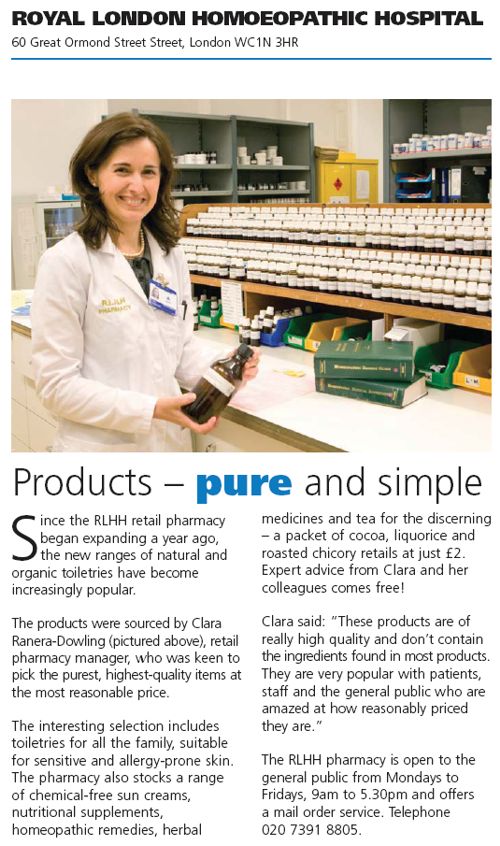
Good heavens, they sell “chemical-free sun cream”. One wonders what it can be made of, if not chemicals. This is the language of low-grade advertising agencies, not what one expects from an NHS hospital trust.
But next to this there is a much more interesting item. Just look at the last sentence.
I wonder if this could possibly have anything to do with the fact that Michael Baum and I visited the Trust headquarters in August 2006 to propose that the RLHH might be turned into a centre of supportive and palliative care? It would be nice to think so. But it seems they haven’t gone nearly far enough yet. If all they do is replace the waning homeopathy We know they are under pressure from their royal patrons, but that, in a constitutional monarchy, is simply not acceptable. |
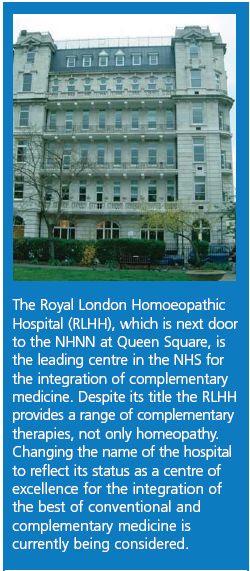 |
Michael Baum is a cancer surgeon who has taken a particular interest in palliative and supportive care. He is someone whose views should be taken seriously. He is also the author of the magnificent “An open letter to the Prince of Wales: with respect, your highness, you’ve got it wrong” Here is a quotation from that letter. The UCLH Trust should bear it in mind.
| The power of my authority comes with a knowledge built on 40 years of study and 25 years of active involvement in cancer research. I’m sensitive to the danger of abusing this power and, as a last resort, I know that the General Medical Council (GMC) is watching over my shoulder to ensure I respect a code of conduct with a duty of care that respects patients’ dignity and privacy and reminds me that my personal beliefs should not prejudice my advice. Your power and authority rest on an accident of birth. Furthermore, your public utterances are worthy of four pages, whereas, if lucky, I might warrant one. I don’t begrudge you that authority and we probably share many opinions about art and architecture, but I do beg you to exercise your power with extreme caution when advising patients with life threatening diseases to embrace unproven therapies. There is no equivalent of the GMC for the monarchy, so it is left either to sensational journalism or, more rarely, to the quiet voice of loyal subjects such as myself to warn you that you may have overstepped the mark. It is in the nature of your world to be surrounded by sycophants (including members of the medical establishment hungry for their mention in the Queen’s birthday honours list) who constantly reinforce what they assume are your prejudices. Sir, they patronise you! Allow me this chastisement. |
Follow-up
The photo album chronicling the birth of my son, is really just for family and friends, but at least one blog picked up on the wider significance.
Alfred Joseph Clark FRS held the established chair of Pharmacology at UCL from 1919 to 1926, when he left for Edinburgh. In the 1920s and 30s, Clark was a great pioneer in the application of quantitative physical ideas to pharmacology. As well as his classic scientific works, like The Mode of Action of Drugs on Cells (1933) he wrote, and felt strongly, about the fraud perpetrated on the public by patent medicine salesmen. In 1938 (while in Edinburgh) he published a slim volume called Patent Medicines. The parallels with today are astonishing.
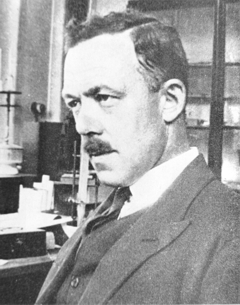 
Alfred Joseph Clark FRS (1885 – 1941) |
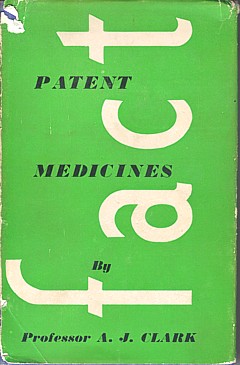 |
I was lucky to be given a copy of this book by David Clark, A.J. Clark’s eldest son, who is now 88. I visited him in Cambridge on 17 September 2008, because he thought that, as holder of the A.J. Clark chair at UCL from 1985 to 2004, I’d be a good person to look after this and several other books from his father’s library. They would have gone to the Department of Pharmacology if we still had one, but that has been swept away by mindless administrators with little understanding of how to get good science.
Quotations from the book are in italic, and are interspersed with comments from me.
The book starts with a quotation from the House of Commons Select Committee report on Patent Medicines. The report was submitted to the House on 4 August 1914, so there is no need to explain why it had little effect. The report differs from recent ones in that it is not stifled by the sort of political correctness that makes politicians refer to fraudsters as “professions”.
The problem
“2.2 The situation, therefore, as regards the sale and advertisement of proprietary medicines and articles may be summarised as follows:
For all practical purposes British law is powerless to prevent any person from procuring any drug, or making any mixture, whether patent or without any therapeutical activity whatever (as long as it does not contain a scheduled poison), advertising it in any decent terms as a cure for any disease or ailment, recommending it by bogus testimonials and the invented opinions and facsimile signatures of fictitious physicians, and selling it under any name he chooses, on payment of a small stamp duty. For any price he can persuade a credulous public to pay.”
Select Committee on Patent Medicines. 1914
“The writer has endeavoured in the present article to analyse the reasons for the amazing immunity of patent medicines form all attempts to curb their activity, to estimate the results and to suggest the obvious measures of reform that are needed.”
| Clark, writing in 1938, was surprised that so little had changed since 1914. What would he have thought if he had known that now, almost 100 years after the 1914 report, the fraudsters are still getting away with it? Chapter 2 starts thus. |
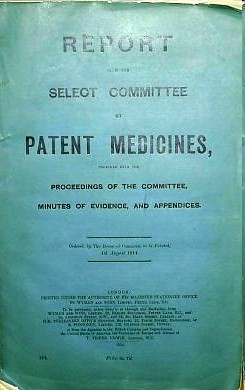 |
THE LAW
The Select Committee appointed by the House of Commons in 1914 ‘to consider and inquire into the question of the sale of Patent and Proprietary Medicines’ stated its opinion in 28 pages of terse and uncompromising invective. Its general conclusions were as follows:
That the trade in secret remedies constituted a grave and widespread public evil.
That the existing law was chaotic and had proved inoperative and that consequently the traffic in secret remedies was practically uncontrolled.
In particular it concluded ‘”that this is an intolerable state of things and that new legislation to deal with it, rather than merely the amendment of existing laws, is urgently needed in the public interest.”
The “widespread public evil”continues almost unabated, and rather than introduce sensible legislation to cope with it, the government has instead given a stamp of approval for quackery by introducing utterly ineffective voluntary “self-regulation”.
Another Bill to deal with patent medicines was introduced in 1931, without success, and finally in 1936, a Medical and Surgical Appliances (Advertisement) Bill was introduced. This Bill had a very limited scope. Its purpose was to alleviate some of the worst abuses of the quack medicine trade by prohibiting the advertisement of cures for certain diseases such as blindness, Bright’s disease [nephritis] , cancer, consumption [tuberculosis], epilepsy, fits, locomotor ataxy, fits, lupus or paralysis.
The agreement of many interests was secured for this measure. The president of the Advertising Association stated that the proposed Bill would not affect adversely any legitimate trade interest. Opposition to the Bill was, however, whipped up amongst psychic healers, anti-vivisectionists and other opponents of medicine and at the second reading in March 1936, the Bill was opposed and the House was counted out during the ensuing debate. The immediate reason for this fate was that the Bill came up for second reading on the day of the Grand National! This is only one example of the remarkable luck that has attended the patent medicine vendors.
(Page 14).
The “remarkable luck” of patent medicine vendors continues to this day, Although, in principle, advertisement of cures for venereal diseases was banned in 1917, and for cancer in 1939, it takes only a few minutes with Google to find that these laws are regularly flouted by quacks, In practice quacks get away with selling vitamin pills for AIDS, sugar pills for malaria and homeopathic pills for rabies, polio anthrax and just about anything else you can think of. Most of these advertisements are contrary to the published codes of ethics of the organisations to which the quack in question belongs but nothing ever happens.
Self-regulation simply does not work, and there is still no effective enforcement even of existing laws..
“It has already been stated that British law allows the advertiser of a secret remedy to tell any lie or make any claim that he fancies will sell his goods and the completeness of this licence is best illustrated by the consideration of a few specific points.
Advertisements for secret remedies very frequently contain a list of testimonials from medical men, which usually are in an anonymous form, stating that ………….. M.D., F.R.C.S., has found the remedy infallible. Occasionally, however, the name and address of a doctor is given and anyone unaware of the vagaries of English law would imagine that such use of a doctor’s name and professional reputation could not be made with impunity without his consent. In 1899, however, the Sallyco Mineral Water Company advertised that ‘Dr. Morgan Dochrill, physician to St. John’s Hospital, London and many of the leading physicians are presenting ‘Sallyco’ as an habitual drink. Dr. Dochrill says nothing has done his gout so much good.
Dr. Dochrill, whose name and title were correctly stated above, sued the company but failed in his case. ”
“The statement that the law does not prevent the recommending of a secret remedy by the use of bogus testimonials and facsimile signatures of fictitious physicians is obviously an understatement since it is doubtful how far it interferes with the use of bogus testimonials from real physicians.”
Dodgy testimonials are still a mainstay of dodgy salesman. One is reminded of the unauthorised citation of testimonials from Dr John Marks and Professor Jonathan Waxman by Patrick Holford to aid his sales of unnecessary vitamin supplements. There is more on this at Holfordwatch.
The man in the street knows that the merits of any article are usually exaggerated in advertisements and is in the habit of discounting a large proportion of such claims, but, outside the realm of secret remedies, the law is fairly strict as regards definite misstatements concerning goods offered for sale and hence the everyday experience of the man in the street does not prepare him for dealing with advertisements which are not merely exaggerations but plain straightforward lies from beginning to end.
Scientific training is undoubtedly a handicap in estimating popular gullibility as regards nostrums. One imagines that no one today would be willing to spend money on pills guaranteed to prevent earthquakes but yet the claims of many of the remedies offered appear equally absurd to anyone with an elementary
knowledge of physiology or even of chemistry. A study of the successes and failures suggests that success depends chiefly on not over-rating the public intelligence. (Page 34)
This may have changed a bit since A.J. Clark was writing in 1938. Now the main clients of quacks seem to be the well-off “worried-well”. But it remains as true as ever that “Scientific training is undoubtedly a handicap in estimating popular gullibility as regards nostrums.” In 2008, it is perhaps more a problem of Ben Goldacre’s dictum ““My basic hypothesis is this: the people who run the media are humanities graduates with little understanding of science, who wear their ignorance as a badge of honour.”
Clark refers (page 36) to a successful conviction for fraud in the USA in 1917. The subject was a widely advertised ‘get fat quick’ pill that contained lecithin, proteins and sugar. The BMA analysis (in 1912)
suggested that the cost of the ingredients in a box of 30 tablets sold for 4/6 was 1 1/4 d. [4/6 meant 4 shillings and six pence, or 22.5 pence since 1971, and 1 1/4 old pence, a penny farthing, is 0.52 new pence]. He comments thus.
The trial revealed many interesting facts. The formula was devised after a short consultation with the expert of one of the largest drug manufacturers in the U.S.A. This firm manufactured the tablets and sold them to the proprietary medicine company at about 3/- per 1000, whilst they were retailed to the public at the rate of £7 10s. per 1000. The firm is estimated to have made a profit of about $3,000,000.
These trials in the U.S.A. revealed the fact that in a considerable proportion of cases the ‘private formula’ department of the large and well known drug firm already mentioned had first provided the formula for the nostrum and subsequently had prepared it wholesale.
Nothing much has changed here either. The alternative medicine industry (and it is a very big industry) is fond of denouncing the evils of the pharmaceutical industry, and sadly, occasionally they are right. One of the less honest practices of the pharmaceutical industry (though one never mentioned by quacks) is buying heavily into alternative medicine. Goldacre points out
“there is little difference between the vitamin and pharmaceutical industries. Key players in both include multinationals such as Roche and Aventis; BioCare, the vitamin pill producer that media nutritionist Patrick Holford works for, is part-owned by Elder Pharmaceuticals.”
And then. of course, there is the deeply dishonest promotion by Boots the Chemists of homeopathic miseducation, of vitamins and of CoQ10 supplements.
The manner in which secret remedies can survive repeated exposure is shown by the following summary of the life history of a vendor of a consumption [tuberculosis] cure.
1904, 1906: Convicted of violating the law in South Africa.
1908: Exposed in British Medical Association report and also attacked by Truth.
1910: Sued by a widow. The judge stated: ‘I think this is an intentional and well-considered fraud. It is a scandalous thing that poor people should be imposed upon and led to part with their money, and to hope that those dear to them would be cured by those processes which were nothing but quack remedies and had not the slightest value of any kind.’
1914: A libel action against the British Medical Association was lost.
1915 The cure was introduced into the United States.
1919 The cure was sold in Canada.
1924 Articles by men with medical qualifications appeared in the Swiss medical journal boosting
the cure.
Secret remedies have a vitality that resembles that of the more noxious weeds and the examples mentioned suggest that nothing can do them any serious harm.
Most of the time, quacks get away with claims every bit as outrageous today. But Clark does give one example of a successful prosecution. It resulted from an exposé in the newspapers -wait for it -in the Daily Mail.
There is, however, one example which proves that a proprietary remedy can be squashed by exposure if this is accompanied by adequate publicity.
The preparation Yadil was introduced as an antiseptic and was at first advertised to the medical profession. The proprietor claimed that the remedy was not secret and that the active principle was ‘tri-methenal allylic carbide’. The drug acquired popularity in the influenza epidemic of 1918 and the proprietor became more and more ambitious in his therapeutic claims. The special virtue claimed for Yadil was that it would kill any harmful organism that had invaded the body. A more specific claim was that consumption in the first stage was cured with two or three pints whilst advanced cases might require a little more. Other advertisements suggested that it was a cure for most known diseases from cancer downwards.
These claims were supported by an extraordinarily intense advertising campaign. Most papers, and even magazines circulating amongst the wealthier classes, carried full page and even double page advertisements. The Daily Mail refused these advertisements and in 1924 published a three column article by Sir William Pope, professor of Chemistry in the University of Cambridge. He stated that
the name ‘tri-methenal allylic carbide’ was meaningless gibberish and was not the chemical definition of any known substance. He concluded that Yadil consisted of :
‘About one per cent of the chemical compound formaldehyde.
About four per cent of glycerine.
About ninety-five per cent of water and, lastly, a smell.
He calculated that the materials contained in a gallon cost about 1/6, whilst the mixture was sold at £4 10s. per gallon.
This exposure was completely successful and the matter is of historic interest in that it is the only example of the career of a proprietary medicine being arrested by the action of the Press.
Clark goes on to talk of the law of libel.
“On the other hand the quack medicine vendor can pursue his advertising campaigns in the happy assurance that, whatever lies he tells, he need fear nothing from the interference of British law. The law does much to protect the quack medicine vendor because the laws of slander and libel are so severe.”
The law of libel to this day remains a serious risk to freedom of speech of both individuals and the media. Its use by rogues to suppress fair comment is routine. My first encounter was when a couple of herbalists
threatened to sue UCL because I said that the term ‘blood cleanser’ is gobbledygook. The fact that the statement was obviously true didn’t deter them for a moment. The herbalists were bluffing no doubt, but they caused enough nuisance that I was asked to take my pages off UCL’s server. A week later I was invited back but by then I’d set up a much better blog and the publicity resulted in an enormous increase in readership, so the outcome was good for me (but bad for herbalists).
It was also good in the end for Andy Lewis when his immortal page “The gentle art of homoeopathic killing” (about the great malaria scandal) was suppressed. The Society of Homeopaths’ lawyers didn’t go for him personally but for his ISP who gave in shamefully and removed the page. As a result the missing page reappeared in dozens of web sites round the world and shot to the top in a Google search.
Chiropractors are perhaps the group most likely to try to suppress contrary opinions by law not argument. The only lawyers’ letter that has been sent to me personally, alleged defamation in an editorial that I wrote for the New Zealand Medical Journal. That was a little scary, but the journal stuck up for its right to speak and the threat went away after chiropractors were allowed right of reply (but we got the last word).
Simon Singh, one of the best science communicators we have, has not been so lucky. He is going to have to defend in court an action brought by the British Chiropractic Association because of innocent opinions expressed in the Guardian.
Chapter 6 is about “The harm done by patent medicines”. It starts thus.
“The trade in secret remedies obviously represents a ridiculous waste of money but some may argue that, since we are a free country and it pleases people to waste their money in this particular way, there is no call for any legislative interference. The trade in quack medicines cannot, however, be regarded as a harmless one. The Poisons Acts fortunately prevent the sale of a large number of dangerous drugs, but there are numerous other ways in which injury can be produced by these remedies.”
The most serious harm, he thought, resulted from self-medication, and he doesn’t mince his words.
“The most serious objection to quack medicines is however that their advertisements encourage self-medication as a substitute for adequate treatment and they probably do more harm in this than in any other manner.
The nature of the problem can best be illustrated by considering a simple example such as diabetes. In this case no actual cure is known to medicine but, on the other hand, if a patient is treated adequately by insulin combined with appropriate diet, he can be maintained in practically normal health, in spite of his disability, for an indefinite period. The expectation of life of the majority of intelligent diabetics, who make no mistakes in their regime, is not much less than that of normal persons. The regime is both irksome and unpleasant, but anyone who persuades diabetics to abandon it, is committing manslaughter as certainly as if he fired a machine gun into a crowded street.
As regards serious chronic disease the influence of secret remedies may be said to range from murderous to merely harmful.
‘Cures’ for consumption, cancer and diabetes may fairly be classed as murderous, since they are likely to cause the death of anyone who is unfortunate enough to believe in their efficacy and thus delay adequate treatment until too late.
The phrase “‘Cures for consumption, cancer and diabetes may fairly be classed as murderous” made Clark himself the victim of suppression of freedom of speech by lawyers. His son, David Clark, wrote of his father in “Alfred Joseph Clark, A Memoir” (C. & J. Clark Ltd 1985 ISBN 0-9510401-0-3)
“Although tolerant of many human foibles, A. J. had always disapproved fiercely of quacks, particularly the charlatans who sold fraudulent medicines. During his visits to London he met Raymond Postgate, then a crusading left wing journalist, who persuaded A.J. to write a pamphlet which was published in an ephemeral series called ‘Fact‘ in March 1938. It was a lively polemical piece. . To A.J.’s surprise and dismay he was sued for libel by a notorious
rogue who peddled a quack cure for for tuberculosis. This man said that A.J.’s remarks (such as “‘Cures’ for consumption, cancer and diabetes may fairly be classed as murderous”) were libellous and would damage his business. A.J. was determined to fight, and he and Trixie decided to put their savings at stake if necessary. The B.M.A. and the Medical Defence Union agreed to support him and they all went to lawyers. He was shocked when they advised him that he would be bound to lose for he had damaged the man’s livelihood! Finally, after much heart searching, he made an apology, saying that he had not meant that particular man’s nostrum”
Talk about déjà vu!
On page 68 there is another very familiar story. It could have been written today.
“The fact that the public is acquiring more knowledge of health matters and is becoming more suspicious of the cruder forms of lies is also helping to weed out the worst types of patent medicine advertisements. For example, in 1751 a bottle of oil was advertised as a cure for scurvy, leprosy and consumption but today such claims would not be effective in promoting the sale of a remedy. The modern advertiser would probably claim that the oil was rich in all the vitamins and the elements essential for life and would confine his claims to a statement that it would alleviate all minor forms of physical or mental ill-health.
The average patent medicine advertised today makes plausible rather than absurd claims and in general the advertisements have changed to conform with a change in the level of the public’s knowledge.
It is somewhat misleading, however, to speak of this as an improvement, since the law has not altered and hence the change only means that the public is being swindled in a somewhat more skilful manner.
The ideal method of obtaining an adequate vitamin supply is to select a diet containing an abundant supply of fresh foods, but unfortunately the populace is accustomed to live very largely on preserved or partially purified food stuffs and such processes usually remove most of the vitamins.”
The first part of the passage above is reminiscent of something that A.J Clark wrote in the BMJ in 1927. Nowadays it is almost unquotable and I was told by a journal editor that it was unacceptable even with asterisks. That seems to me a bit silly. Words had different connotations in 1927.
“The less intelligent revert to the oldest form of belief and seek someone who will make strong magic for them and defeat the evil spirits by some potent charm. This is the feeling to which the quack appeals; he claims to be above the laws of science and to possess some charm for defeating disease of any variety.
The nature of the charm changes with the growth of education. A naked n****r howling to the beat of a tom-tom does not impress a European, and most modern Europeans would be either amused or disgusted by the Black mass that was popular in the seventeenth century. Today some travesty of physical science appears to be the most popular form of incantation.”
A.J. Clark (1927) The historical aspect of quackery, BMJ October 1st 1927
Apart from some of the vocabulary, what better description could one have of the tendency of homeopaths to harp on meaninglessly about quantum theory or the “scienciness” and “referenciness” of
modern books on nutritional therapy?
So has anything changed?
Thus far, the outcome might be thought gloomy. Judging by Clark’s account, remarkably little has changed since 1938, or even since 1914. The libel law in the UK is as bad now as it was then. Recently the United Nations Human Rights Committee said UK laws block matters of public interest and encourage libel tourism (report here, see also here). It is unfit for a free society and it should be changed.
But there are positive sides too. Firstly the advent of scientific bloggers has begun to have some real influence. People are no longer reliant on journalists to interpret (or, often, misinterpret) results for them. They can now get real experts and links to original sources. Just one of these, Ben Goldacre’s badscience.net, and his weekly column in the Guardian has worked wonders in educating the public and improving journalism. Young people can, and do, contribute to the debate because they can blog anonymously if they are frightened that their employer might object.
Perhaps still more important, the law changed this year. Now, at last, it may be possible to prosecute successfully those who make fraudulent health claims. Sad to say, this was not an initiative of the UK government, which remains as devoted as ever to supporting quacks. Remember that, quite shamefully, the only reason given by the Medicines and Health Regulatory Authority (MHRA) gave for allowing false labelling of homeopathic pills was to support the “homeopathic industry”. They suggested (falsely) that the EU required them to take this irresponsible step, which was condemned by just about every scientific organisation. But the new unfair trading regulations did come from the EU. After almost 100 years since the 1914 report, we have at last some decent legislation. Let’s hope it’s enforced.
Postcript
The back cover of the series of ‘Fact‘ books in which A.J. Clark’s article appeared is reproduced below, simply because of the historical portrait of the 1930s that it gives.
Follow-up
This post got a lot of hits from Ben Goldacre’s miniblog which read
- Prof David Colquhoun gets into a time machine and meets himself
A truly classic DC post.
Thanks, Ben.
Today is a good day for anyone who deplores dangerous confidence tricksters. In particular it is a good day for Ben Goldacre, and for the Guardian which defended him at potentially enormous expense.
| Matthias Rath, the Dutch (or is it German) vitamin salesman has dropped his libel action against the Guardian. He is the man who is, without doubt, responsible for many deaths form AIDS in Africa, as a result of peddling vitamin pills as cures. The action was taken after Goldacre said, in the Guardian, that Rath aggressively sells his message to Aids victims in South Africa that Rath vitamin pills are better than medication”. | 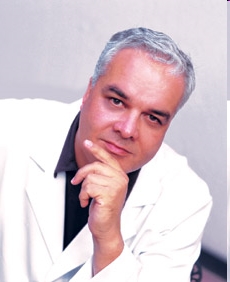 |
Here is some of what has appeared already today
Fall of the doctor who said his vitamins would cure Aids – from The Guardian, with a video of the villain.
Goldacre’s Badscience blog article on his victory .
Profile of Zackie Achmat – from The Guardian, Mr Achmat is the founder of the Treatment Action Campaign , instrumental in exposing Rath.
Extract from witness statements from the defence in the trial .
And a lot of publicity from Gimpyblog (“Ben Goldacre and The Guardian triumph over murderous Matthias Rath”), Holfordwatch , Quackometer and jdc325 blogs.
Then more in the Guardian the next day, Chris McGreal investigates the Rath Foundation
Nutritional therapist?
Let’s be clear about what the words mean. Nutritional therapists are not like dietitians, and they are not like nutritionists. Nutritional therapists are solidly in the camp of alternative medicine practitioners, Don’t
take my word for it. They say so themselves.
“For nutritional therapists (who practise Complementary and Alternative Medicine) optimum nutrition encompasses individual prescriptions for diet and lifestyle in order to alleviate or prevent ailments and to promote optimal gene expression through all life stages. Recommendations may include guidance on natural detoxification, procedures to promote colon health, methods to support digestion and absorption, the avoidance of toxins or allergens and the appropriate use of supplementary nutrients, including phytonutrients.”
They love to use imaginary words like “detoxification”, and, much more dangerously, they love to pretend that they can cure diseases by changes in diet. As long as you buy from them a stack of expensive “supplement” pills, of course. That means they are selling medicines, but by pretending they are selling food supplements they manage to evade the law that requires medicines to be safe and effective. That will not be so easy under new legislation though, and we can look forward to a few prosecutions soon.
Guess who runs an “Honours BSc degree” in Nutritional Therapy. No prizes for realising it is the UK’s leading university purveyor of woo.
The University of Westminster
On their web site we learn that the Course Leader is Heather Rosa, and the Deputy Course Leader is Val Harvey. Harvey qualified in the subject at the Institute of Optimum Nutrition, the private college run by none other than the famous pill-peddler, Patrick Holford, about whom so very much has been written (try Holfordwatch, or the masterly chapter in Goldacre’s Bad Science)
We don’t know much about what is taught on the Nutritional Therapy course because the University of Westminster has refused repeated requests to say (but watch this space).. One can only assume that, whatever it is, they are not very proud of it. It seems a little unlikely that they will go as far as Matthias Rath and claim to cure AIDS -we’ll just have to wait and see. Meanwhile we can get an inkling by looking elsewhere.
Course leader, Heather Rosa, pops up for example, on the expert panel of a web site called Supplements Compared.com. “Supplements Compared is designed to help you find the best dietary supplement product for your health needs.” And what sort of advice do you find there? Try the page that compares 10 brands of CoQ10 (that is the stuff I wrote about recently, in “Boots reaches new level of dishonesty with CoQ10 promotion” – their advertising was deemed improper by the ASA ). It isn’t a recommended treatment for anything at all, but you certainly wouldn’t guess that from what is written by the ‘expert panel’. The winners are, according to the ‘expert panel’, Boots’ CoQ10 and Holland and Barrett’s CoQ10. Winners? Perhaps the explanation for that comes elsewhere, under “How are we funded?”. “Manufacturers who are awarded “best product” and “worth a look” are given the opportunity to promote this fact throughout the site for an additional fee.”. Well well.
Deputy Course leader, Val Harvey has her own web site and business (I do hope thar Westminster does not pay these people a full time salary too). What can we glean from there? It has the usual scare tactics “Why
you are at risk?“. Never fear; buy enough vitamin pills and you’ll be saved.
Her home page makes some pretty drastic claims.
“Potential health benefits of your nutritional programme
An appropriate Nutritional Programme can benefit many conditions including:
Allergies
Arthritis
Asthma
Bloating, indigestion
Chronic degenerative diseases
Chronic fatigue, ME
Constipation, diarrhoea
Cystitis
Depression, mood swings
Digestive or bowel problems
Eczema, psoriasis, other skin problems
Food sensitivities
Frequent infections
Hormone imbalanceHypertension or elevated cholesterol
Irritable bowel syndrome
Low energy
Menopausal symptoms
Migraines, headaches
Parasitic and fungal infections
Pre-conceptual issues
Premenstrual syndrome (PMS)
Sinus congestion
Stress
Thrush
Weight problems
and many others ….
These are just some of the wide range of health problems that may be helped by nutritional therapy. Even those who consider themselves well and healthy may be able to enhance their physical and mental health, as well as their performance, including athletic performance, by improving their nutrition.”
There is, in my view, not the slightest bit of good evidence that swallowing vitamin pills can benefit most of these conditions.
But at least the list doesn’t contain AIDS, so is all this really relevant to the case of Matthias Rath?
Yes, I believe it is. The University of Westminster may well not support the views of Matthias Rath (they won’t say), but we have heard no choruses of protests about him from any nutritional therapists, as far as I’m aware. There is no mention of him at all on the web site of the British Association of Nutritional Therapists (BANT), the UK club for these people. BANT, by the way, has a rather curious code of ethics. It allows its members to take undisclosed financial kickbacks for the pills they prescribe to patients. If doctors were caught doing that they’d be struck off the register.
It is the existence of degrees in subjects like “nutritional therapy” that gives the subject a spurious air of respectability which allows seriously dangerous people like Rath to flourish with very little criticism. In an indirect way, the vice-chancellors who allow it to flourish (and Universities UK who do nothing about it) must bear some small part of the responsibility for the deaths of thousands of people from AIDS.
It is about time they did something about it.
Follow-up
ANH. The first reaction from the supplement-peddling industry comes from the Alliance for Natural Health on 16th September. It contains not one word of condemnation for Rath’s murderous activities. It’s hard to believe how low they will sink.
The Prince’s Foundation for Integrated Health remains totally silent about Rath. HRH’s concern for health seems to dry up if things don’t suit his views.
The British Association of Nutritional Therapists shows it’s total irresponsibility after a letter was sent to them to ask about their reaction. Their answer , on jdc325’s weblog was “The association has no opinion to offer on Dr Raths vitamin trials.”.
After the announcement that the University of Central Lancashire (Uclan) was suspending its homeopathy “BSc” course, it seems that their vice chancellor has listened to the pressure, both internal and external, to stop bringing his university into disrepute.
An internal review of all their courses in alternative medicine was announced shortly after the course closure. Congratulations to Malcolm McVicar for grasping the nettle at last. Let’s hope other universities follow his example soon.
I have acquired, indirectly, a copy of the announcement of the welcome news.
| Homeopathy, Herbalism and cupuncture Concern has been expressed by some colleagues as to whether the University should offer courses in homeopathy, Herbalism and Acupuncture. Therefore, to facilitate proper discussion on this matter I have set up a working party to review the issues. I have asked Eileen Martin, Pro Vice-Chancellor and Dean of the Faculty of Health, to lead this working party and report to me as soon as possible. Whilst the review is taking place, we need to recognise that there are students and staff studying and teaching on these courses which have satisfied the University’s quality assurance procedures and been duly validated. I would therefore ask that colleagues would refrain from comment or speculation which would cause concern to these students and staff. Staff who wish to express their views on this issue should direct these to Eileen Martin, by the end of September. Regards Malcolm McVicar Vice-Chancellor |
Times Higher Education today reports
“The University of Central Lancashire is to review all its courses in homoeopathy, herbalism and acupuncture after some staff said it should not be offering degrees in “quackery”, Times Higher Education has learnt.
A university spokesman said: “As a university we value and practise transparency and tolerance and welcome all academic viewpoints.”
(Later, an almost identical version of the story ran on the Times Online.)
So far, so good. But of course the outcome of a committee depends entirely on who is appointed to it. Quite often such committees do no more than provide an internal whitewash.
It does seem a bit odd to appoint as chair the dean of the faculty where all these course are run, and presumably generate income. Eileen Martin has often appeared to be proud of them in the past. Furthermore, the whole investigation will (or should) turn on the assessment of evidence. It needs some knowledge of the design of clinical trials and their statistical analysis, As far as I can see, Ms Martin has essentially no research publications whatsoever.
I also worry about a bit about “satisfied the University’s quality assurance procedures and been duly validated”. One point of the investigation should be recognise frankly that the validation process is entirely circular, and consequently worth next to nothing. It must be hard for a vice-chancellor to admit that, but it will be an essential step in restoring confidence in Uclan.
Let’s not prejudge though. If there are enough good scientists on the committee, the result will be good.
I hope that transparency extends to letting us know who will be doing the judging. Everything depends on that.
Follow-up
Well well, there’s a coincidence, Once again, the week after a there is an announcement about degrees in witchcraft, what should pop up again in the column of the inimitable Laurie Taylor in THE. The University of Poppleton’s own Department of Palmistry.
| Letter to the editor
Dear Sir I was shocked to see yet another scurrilous attack upon the work of my department in The Poppletonian. Although Palmistry is in its early days as an academic discipline it cannot hope to progress while there are people like your correspondent who insist on referring to it as “a load of superstitious nonsense which doesn’t deserve a place on the end of the pier let alone in a university”. A large number of people claim to have derived considerable benefit from learning about life lines, head lines and heart lines and the role of the six major mounts in predicting their future. All of us in the Palmistry Department believe it vitally important that these claims are rigorously examined. How else can science advance? Yours sincerely, |
We have often had cause to criticise Boots Alliance, the biggest retail pharmacist in the UK, because of its deeply unethical approach to junk medicine. Click here to read the shameful litany. The problem of Boots was raised recently also by Edzard Ernst at the Hay Literary Festival. He said
“The population at large trusts Boots more than any other pharmacy, but when you look behind the smokescreen, when it comes to alternative medicines, that trust is not justified.”
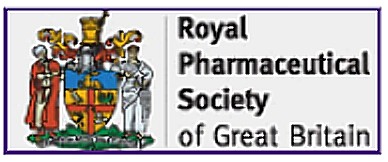
Ernst accused Boots of breaching ethical guidelines drawn up by the Royal Pharmaceutical Society of Great Britain, by failing to tell customers that its homeopathic medicines contain no active ingredients and are ineffective in clinical trials.
Another chain, Lloyds Pharmacy, are just as bad. Many smaller pharmacies are no more honest when it comes to selling medicines that are known to be ineffective.
Pharmacists are fond of referring to themselves as “professionals” who are regulated by a professional body, the Royal Pharmaceutical Society of Great Britain (RPSGB). It’s natural to ask where their regulatory body stands on the question of junk medicine. So I asked them, and this is what I found.
| 17 April, 2008
I am writing an article about the role of pharmacists in giving advice about (a) alternative medicines and (b) nutritional supplements. I can find no clear statements about these topics on the RPSGB web site. Please can you give me a statement on the position of the Royal Pharmaceutical Society on these two topics. In particular, have you offered guidance to pharmacists about how to deal with the conflict of interest that arises when they can make money by selling something that they know to have no good evidence for efficacy? This question has had some publicity recently in connection with Boots’ promotion of CCoQ10 to give you “energy”, and only yesterday when the bad effects of some nutritional supplements were in the news. |
Here are some extracts from the first reply that I got from the RPSGB’s Legal and Ethical Advisory Service (emphasis is mine).
| 28 April 2008
Pharmacists must comply with the Code of Ethics and its supporting documents. Principle 5 of the Code of Ethics requires pharmacists to develop their professional knowledge and competence whilst Principle 6 requires pharmacists to be honest and trustworthy. The Code states: 5. DEVELOP YOUR PROFESSIONAL KNOWLEDGE AND COMPETENCE At all stages of your professional working life you must ensure that your knowledge, skills and performance are of a high quality, up to date and relevant to your field of practice. You must: 5.1 Maintain and improve the quality of your work by keeping your knowledge and skills up to date, evidence-based and relevant to your role and responsibilities. 5.2 Apply your knowledge and skills appropriately to your professional responsibilities. 5.3 Recognise the limits of your professional competence; practise only in those areas in which you are competent to do so and refer to others where necessary. 5.4 Undertake and maintain up-to-date evidence of continuing professional development relevant to your field of practice. 6. BE HONEST AND TRUSTWORTHY Patients, colleagues and the public at large place their trust in you as a pharmacy professional. You must behave in a way that justifies this trust and maintains the reputation of your profession. You must: 6.2 Ensure you do not abuse your professional position or exploit the vulnerability or lack of knowledge of others. 6.3 Avoid conflicts of interest and declare any personal or professional interests to those who may be affected. Do not ask for or accept gifts, inducements, hospitality or referrals that may affect, or be perceived to affect, your professional judgement. 6.4 Be accurate and impartial when teaching others and when providing or publishing information to ensure that you do not mislead others or make claims that cannot be justified. |
And, on over-the counter prescribing
| In addition the “Professional Standards and Guidance for the Sale and Supply of Medicines” document which supports the Code of Ethics states:
“2. SUPPLY OF OVER THE COUNTER (OTC) MEDICINES STANDARDS When purchasing medicines from pharmacies patients expect to be provided with high quality, relevant information in a manner they can easily understand. You must ensure that: 2.1 procedures for sales of OTC medicines enable intervention and professional advice to be given whenever this can assist the safe and effective use of medicines. Pharmacy medicines must not be accessible to the public by self-selection. |
Evidence-based? Accurate and impartial? High quality information? Effective use?
These words don’t seem to accord with Boots’ mendacious advertisements for CoQ10 (which were condemned by the ASA).
Neither does it accord with the appalling advice that I got from a Boots pharmacist about Vitamin B for vitality.
Or their bad advice on childhood diarrhoea.
Or the unspeakable nonsense of the Boots (mis)-education web site.
Then we get to the nub. This is what I was told by the RPSGB about alternative medicine (the emphasis is mine).
| 8. COMPLEMENTARY THERAPIES AND MEDICINES
STANDARDS You must ensure that you are competent in any area in which you offer advice on treatment or medicines. If you sell or supply homoeopathic or herbal medicines, or other complementary therapies, you must: 8.1 assist patients in making informed decisions by providing them with necessary and relevant information. 8.2 ensure any stock is obtained from a reputable source. 8.3 recommend a remedy only where you can be satisfied of its safety and quality, taking into account the Medicines and Healthcare products Regulatory Agency registration schemes for homoeopathic and herbal remedies.” Therefore pharmacists are required to keep their knowledge and skills up to date and provide accurate and impartial information to ensure that you do not mislead others or make claims that cannot be justified. |
It does seem very odd that “accurate and impartial information” about homeopathic pills does not include mentioning that they contain no trace of the ingredient on the label. and have been shown in clinical trials to be ineffective. These rather important bits of information are missing from both advertisements and from (in my experience) the advice given by pharmacists in the shop.
If you look carefully, though, the wording is a bit sneaky. Referring to over-the-counter medicines, the code refers to “safe and effective use of medicines”, but when it comes to alternative medicines, all mention of ‘effectiveness’ has mysteriously vanished.
So I wrote again to get clarification.
| 29 April, 2008
Thanks for that information. I’d appreciate clarification of two matters in what you sent. (1) Apropros of complementary and alternative medicine, the code says 8.3 recommend a remedy only where you can be satisfied of its safety and quality I notice that this paragraph mentions safety and quality but does not mention efficacy. Does this mean that it is considered ethical to recommend a medicine when there is no evidence of its efficacy? Apparently it does. This gets to the heart of my question and I’d appreciate a clear answer. |
This enquiry was followed by a long silence. Despite several reminders by email and by telephone nothing happened until eventually got a phone call over a month later (May 3) from David Pruce, Director of Practice & Quality Improvement, Royal Pharmaceutical Society of Great Britain. The question may be simple, but the RPSGB evidently it hard, or more likely embarrassing, to answer.
When I asked Pruce why para 8.3 does not mention effectiveness, his reply, after some circumlocution, was as follows.
Pruce: “You must assist patients in making informed decisions by providing necessary and relevant information . . . we would apply this to any medicine, the pharmacist needs to help the patient assess the risks and benefits.”
DC: “and would that include saying it doesn’t work better than placebo?”
Pruce “if there is good evidence to show that it may, but it depends on what the evidence is, what the level of evidence is, and the pharmacist’s assessment of the evidence”
DC “What’s your assessment of the evidence?”
Pruce, “I don’t think my personal assessment is relevant. I wouldn’t want to be drawn on my personal assessment”. “If a pharmacist is selling homeopathic medicines they have to assist the patient in making informed decisions”
“I don’t think we specifically talk about the efficacy of any other medicine” [DC: not true, see para 2.1, above]
“We would expect pharmacists to be making sure that what they are providing to a patient is safe and efficacious”
DC “So why doesn’t it mention efficacious in para 8.3”
Pruce “What we are trying to do with the Code of Ethics is not go down to the nth degree of detail ” . . . “there are large areas of medicine where there is an absence of data”
DC “Yes, actually homeopathy isn’t one of them. It used to be.”
Pruce. “uh, that’s again a debatable point”
DC I don’t think it’s debatable at all, if you’ve read the literature
Pruce. “well many people would debate that point” “This [homeopathy] is a controversial area where opinions are divided on it”
DC “Not informed opinions”
Pruce “Well . . . there are also a large number of people that do believe in it. We haven’t come out with a categorical statement either way.”
I came away from this deeply unsatisfactory conversation with a strong impression that the RPSGB’s Director of Practice & Quality Improvement was either not familiar with the evidence, or had been told not to say anything about it, in the absence of any official statement about alternative medicine.
I do hope that the RPSGB does not really believe that “there are also a large number of people that do believe in it” constitutes any sort of evidence.
It is high time that the RPSGB followed its own code of ethics and required, as it does for over-the-counter sales, that accurate advice should be given about “the safe and effective use of medicines”.
“The scientist on the High Street”
The RPS publishes a series of factsheets for their “Scientist in the High Street” campaign. One of these “factsheets” concerns homeopathy, [download pdf from the RPSGB]. Perhaps we can get an answer there?
Well not much. For the most part the “factsheet” just mouths the vacuous gobbledygook of homeopaths. It does recover a bit towards the end, when it says
“The methodologically “best” trials showed no effect greater than that of placebo”.
But there is no hint that this means pharmacists should not be selling homeopathic pills to sick people..
That is perhaps not surprising, because the Science Committee of the RPSGB copped out of their responsibility by getting the factsheet written by a Glasgow veterinary homeopath, Steven Kayne. You can judge his critical attitude by a paper (Isbell & Kayne, 1997) which asks whether the idea that shaking a solution increases its potency. The paper is a masterpiece of prevarication, it quotes only homeopaths and fails to come to the obvious conclusion. And it is the same Steven Kayne who wrote in Health and Homeopathy (2001)
“Homeopathy is not very good for treating bacterial infections directly, apart from cystitis that often responds to a number of medicines, including Berberis or Cantharis”.
So there is a bacterial infection that can be cured by pills that contain no medicine? Is this dangerous nonsense what the RPSGB really believes?
More unreliable advice
While waiting for the train to Cardiff on April 16th (to give a seminar at the Welsh School of Pharmacy), I amused myself by dropping into the Boots store on Paddington station.
| DC I’ve seen your advertisements for CoQ10. Can you tell me more? Will they really make me more energetic?
Boots: Yes they will, but you may have to take them for several weeks. DC. Several weeks? Boots: yes the effect develops only slowly Peers at the label and reads it out to me DC I see. Can you tell me whether there have been any trials that show it works? Boots. I don’t know. I’d have to ask. But there must be or they wouldn’t be allowed to sell it. DC. Actually there are no trials, you know Boots. Really? I didn’t think that was allowed. But people have told me that they feel better after taking it. DC You are a pharmacist? Boots. Yes |
Sadly, this abysmal performance is only too typical in my experience, Try it yourself.
The malaria question
After it was revealed that pharmacists were recommending, or tolerating recommendations, of homeopathic treatment of malaria, the RPSGB did, at last. speak out. It was this episode that caused Quackometer to write his now famous piece on ‘The gentle art of homeopathic killing‘ (it shot to fame when the Society of Homeopaths tried to take legal action to ban it) Recommending pills that contain no medicine for the treatment or prevention or treatment of malaria is dangerous. If it is not criminal it ought to be [watch the Neals Yard video]. .
The RPSGB says it is investigating the role of pharmacists in the Newsnight sting (see the follow-up here). That was in July 2006, but they are stlll unwilling to say if any action will be taken. Anyone want to bet that it will be swept under the carpet?
The statement issued by the RPSGB, 5 months after the malaria sting is just about the only example that I can find of them speaking out against dangerous and fraudulent homeopathic practices. Even in this case, it is pretty mild and restricted narrowly to malaria prevention.
The RPSGB and the Quacktioner Royal
The RPSGB submitted a response to the ‘consultation’ held by the Prince’s Foundation for Integrated Health, about their Complementary Healthcare; a guide for patients.
| Response by the Royal Pharmaceutical Society of Great Britain Dr John Clements, Science Secretary “We believe that more emphasis should be given to the need for members of the public who are purchasing products (as opposed to services) to ask for advice about the product. Pharmacists are trained as experts on medicines and the public, when making purchases in pharmacies, would expect to seek advice from pharmacists” |
So plenty of puffery for the role of pharmacists. But there is not a word of criticism about the many barmy treatments that are included in the “Guide for Patients”. Not just homeopathy and herbalism, but also Craniosacral therapy, Laying on of Hands, chiropractic, Reiki, Shiatsu –every form of barminess under the sun drew no comment from the RPS.
I can’t see how a response like this is consistent with the RPS’s own code of ethics.
A recent president of the RPSGB was a homeopath
| Christine Glover provides perhaps the most dramatic reason of all for thinking thst, despite all the fine words, the RPSGB cares little for evidence and truth The NHS Blogdoctor published “Letter from an angry pharmacist”. | 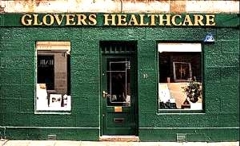 |
Mrs Glover was president of the RPSGB from 1999 to 2001, vice-president in 1997-98, and a member of the RPSGB Council until May 2005. She is not just a member, but a Fellow. (Oddly, her own web site says President from 1998 – 2001.)
So it is relevant to ask how the RPSGB’s own ex-president obeys their code of ethics. Here are some examples on how Ms Glover helps to assist the safe and effective use of medicines. . Much of her own web site seems to have vanished (I wonder why) so I’ll have to quote the “Letter from an angry pharmacist”., as revealed by NHS Blogdoctor,
“What has Christine got to offer?
- “We offer a wide range of Homeopathic remedies (over 3000 different remedies and potencies) as well as Bach flower remedies, Vitamins, Supplements, some herbal products and Essential Oils.”
- Jetlag Tablets highly recommended in ‘Wanderlust’ travel magazine. Suitable for all ages.
- Wind Remedy useful for wind particularly in babies. In can be supplied in powder form for very small babies. Granules or as liquid potency.
- Udder Care 100ml £80.00 One capful in sprayer filled with water. Two jets to be squirted on inner vulva twice daily for up to 4 days until clots reduced. Discard remainder. Same dose for high cell-counting cows detected.
Udder Care? Oh! I forgot to say, “Glover’s Integrated Healthcare” does cows as well as people. Dr Crippen would not suggest to a woman with sore breasts that she sprayed something on her inner vulva. But women are women and cows are cows and Dr Crippen is not an expert on bovine anatomy and physiology. But, were he a farmer, he would need some persuasion to spend £80.00 on 100 mls of a liquid to squirt on a cow’s vulva. Sorry, inner vulva.”
Nothing shows more clearly that the RPSGB will tolerate almost any quackery than the fact that they think Glover is an appropriate person to be president. Every item on the quotation above seems to me to be in flagrant breach of the RPSGB’s Code of Ethics. Just like the Society of Homeopaths, the code seems to be there merely for show, at least in the case of advice about junk medicine..
A greater role for pharmacists?
This problem has become more important now that the government proposes to give pharmacists a greater role in prescribing. Needless to say the RPSGB is gloating about their proposed new role. Other people are much less sure it is anything but a money–saving gimmick and crypto-privatisation.
I have known pharmacists who have a detailed knowledge of the actions of drugs, and I have met many more who haven’t. The main objection, though, is that pharmacists have a direct financial interest in their prescribing. Conflicts of interest are already rife in medicine, and we can’t afford them.
Conclusion
The Royal Pharmaceutical Society is desperately evasive about a matter that is central to their very existence, giving good advice to patients about which medicines work and which don’t. Pharmacists should be in the front line in education of the public, about medicines, the ‘scientist on the High Street’. Some of them are, but their professional organisation is letting them down badly.
Until such time as the RPSGB decides to take notice of evidence, and clears up some of the things described here, it is hard to see how they can earn the respect of pharmacists, or of anyone else.
Follow-up
Stavros Isaiadis’ blog, Burning Mind, has done a good piece on “More on Quack Medicine in High Street Shops“.
The Chemist and Druggist reports that the RPSGB is worried about the marketing of placebo pills (‘obecalp’ -geddit?). It does seem very odd that the RPSGB should condemn honest placebos, but be so very tolerant about dishonest placebos. You couldn’t make it up.
A complaint to the RPSGB is rejected
Just to see what happened, I made a complaint to thr RPSGB about branches of their own Code of Ethics at Boots in Hexham and in Evesham. Both of them supported Homeopathy Awareness Week These events had been publicised in those particularly unpleasent local ‘newspapers’ that carry paid advertising disguised as editorial material. In this case it was the Evesham Journal and the Hexham Courant.
Guess what? The RPSGB replied thus
“Your complaint has been reviewed bt Mrs Jill Williams and Mr David Slater who are both Regional Lead Inspectors. Having carried out a review they have concluded that support of homeopathic awareness week does not constitute a breach of the Society’s Code of Ethics or Professional Standards.”
In case you have forgotten, the Professional Standards say
2.1 procedures for sales of OTC medicines enable intervention and professional advice to be given whenever this can assist the safe and effective use of medicines.
The RPSGB has some very quaint ideas on how to interpret their own code of ethics
After writing the recent post Boots reaches new level of dishonesty with CoQ10 promotion, I sent a complaint about the dishonesty of the advertisements to the Advertising Standards Authority. I got a surprsingly fast response. On April 22 I got
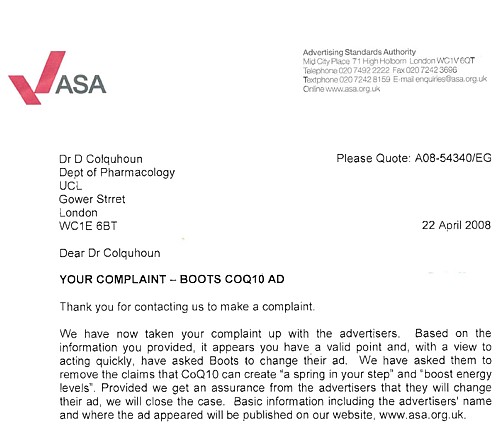
“it appears you have a valid point and, with a view to acting quickly, have asked Boots to change their ad. We have asked them to remove the claims that CoQ1 0 can create “a spring in your step” and “boost energy levels”. Provided we get an assurance from the advertisers that they will change their ad, we will close the case.”
Then on 1 May, the ASA said
“We have now received a response from Boots and they have given us an assurance that they will not repeat the problematic claims for this product. We have therefore closed our file on that basis.”
Boots agreed to this request, so no full investigation will appear. That’s a win for reason, up to a point, but it also shows how toothless the rules about advertising are. Boots launch a big promotion with advertisements that are simply not true. The promotion is over and they got clean away with it. All they get is a little publicised rap on the knuckles and no doubt they’ll do the same again next time.
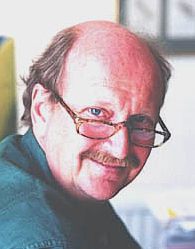 |
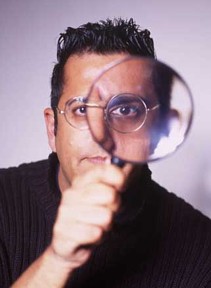 |
The Times published a letter from Edzard Ernst and Simon Singh on April 16th. In their forthcoming book, Trick or Treatment? Alternative Medicine on Trial, they go carefully through all the evidence for all sorts of ‘alternative’ treatments. They find some evidence that a handful of them work. For most the answer is ‘not enough evidence’, and for a number there is good evidence that many of them don’t work to any useful extent.
“Sir, For over two decades the Prince of Wales has been actively promoting alternative medicine and his Foundation for Integrated Health continues to encourage the use of treatments such as homoeopathy or reflexology.””In light of this “rigorous scientific evidence”, we strongly advise that the Prince of Wales and the Foundation for Integrated Health withdraw the publications Complementary Health Care: A Guide for Patients and the Smallwood report. They both contain numerous misleading and inaccurate claims concerning the supposed benefits of alternative medicine. The nation cannot be served by promoting ineffective and sometimes dangerous alternative treatments.”
Thank heavens that someone has the courage to say it as it is.
If only the ineffectual and ill-educated people in the Department of Health wouold do the same. But no, instead they gave £37 000 to the Prince of Wales Foundation to write their make-believe guides. And £900 000 to write nonsense for the Complementary and Natural Healthcare Council (also known as Ofquack), and Skills for Health,
The next day The Times ran an article by their science editor, Mark Henderson, Prince of Wales’s guide to alternative medicine ‘inaccurate’. Natasha Finlayson, of the Prince’s Foundation for Integrated Health, is quoted as saying “The foundation does not promote complementary therapies.”. That takes some beating for sheer bare-faced dishonesty.
Edzard Ernst appeared on the Today Program on 18th April. He was interveiwed by the formidable John Humphrys, along with Kim Lavely, Chief Executive, The Prince’s Foundation for Integrated Health (FIH). Ernst points out that the FIH guide suggests that chiropractic is effective in asthma, and that acupuncture is good for addiction, whereas the evidence says the opposite. Lavely retorts, rather lamely (OK I’m biassed).
Lavely: ” . . . we didn’t attempt to give detailed evidence on every therapy”. “We think they [the public] have the right to know and what doesn’t”
Humphrys: “Well isn’t that the whole point? the professor is saying here is that these things do not work, at least in terms of the claims that are made for them, such as homeopathy and chiropractic . . . ”
Lavely: “There are no claims made in this guide for what works and what doesn’t. What we have said is that some therapies are used for some things but we aren’t saying they are effective for those things . . . “
So, one might ask, what on earth is the use of a guide is it that offers no indication of effectiveness? Lavely’s second quotation contradicts directly her first. A pretty pathetic performance.
Listen to the interview [mp3 file]
The Sunday Times, on April 20th, pblished a pretty good review of Trick of Treatment?. “Their case against the folly, vanity and damage of HRH et al. is hard to argue with.”
Of course, the letters column drew the expected response from the quacks, most verging on the hilarious.
Another blow for the alternative industry came in the same week, The authoratitve Cochrane review confirmed earlier reports that vitamin supplements not only do not help you but some actually increase mortality. The antioxidant myth nevertheless rumbles on, and on, and on. There is too much money in it for it to die easily.
Predictably enough, the conclusions were denied by the Health Food Manufacturers’ Association (HFMA). They wheeled out several pop singers to say how wonderful their products are. Read about that pathetic defence on Holfordwatch.
Who is behind HFMA? Incidentally, HFMA are strangely reticent about the identity of their 120 members. They will not reveal who they are. Does anybody out there know the answer? I’ll buy a good dinner for anyone who can root this out. If it is anything like the ‘Health Supplements Information Service‘ it is likely to be backedby the very big pharmaceutical companies that the alternative industry loves to hate.
Take the test
Prince of Wales Guide
“Reflexologists work with a wide range of conditions including certain types of pain, particularly back and neck pain, migraine and headaches, chronic fatigue, sinusitis, arthritis, insomnia, digestive problems such as irritable bowel syndrome, and constipation, stress-related disorders and menopausal symptoms.”
Singh & Ernst
“The notion that reflexology can be used to diagnose health problems has been disproved and there is no convincing evidence that it is effective for any condition.”
This is a fuller version, with links, of the comment piece published in Times Higher Education on 10 April 2008. Download newspaper version here.
If you still have any doubt about the problems of directed research, look at the trenchant editorial in Nature (3 April, 2008. Look also at the editorial in Science by Bruce Alberts. The UK’s establishment is busy pushing an agenda that is already fading in the USA.
Since this went to press, more sense about “Brain Gym” has appeared. First Jeremy Paxman had a good go on Newsnight. Skeptobot has posted links to the videos of the broadcast, which have now appeared on YouTube.
Then, in the Education Guardian, Charlie Brooker started his article about “Brain Gym” thus
Dr Aust’s cogent comments are at “Brain Gym” loses its trousers. |
 |
The Times Higher’s subeditor removed my snappy title and substituted this.
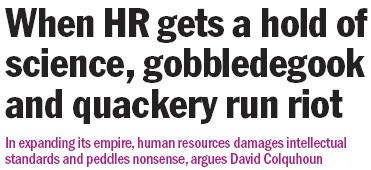
So here it is.
“HR is like many parts of modern businesses: a simple expense, and a burden on the backs of the productive workers”, “They don’t sell or produce: they consume. They are the amorphous support services” .
So wrote Luke Johnson recently in the Financial Times. He went on, “Training advisers are employed to distract everyone from doing their job with pointless courses”. Luke Johnson is no woolly-minded professor. He is in the Times’ Power 100 list, he organised the acquisition of PizzaExpress before he turned 30 and he now runs Channel 4 TV.
Why is it that Human Resources (you know, the folks we used to call Personnel) have acquired such a bad public image? It is not only in universities that this has happened. It seems to be universal, and worldwide. Well here are a few reasons.
Like most groups of people, HR is intent on expanding its power and status. That is precisely why they changed their name from Personnel to HR. As Personnel Managers they were seen as a service, and even, heaven forbid, on the side of the employees. As Human Resources they become part of the senior management team, and see themselves not as providing a service, but as managing people. My concern is the effect that change is having on science, but it seems that the effects on pizza sales are not greatly different.
The problem with having HR people (or lawyers, or any other non-scientists) managing science is simple. They have no idea how it works. They seem to think that every activity
can be run as though it was Wal-Mart That idea is old-fashioned even in management circles. Good employers have hit on the bright idea that people work best when they are not constantly harassed and when they feel that they are assessed fairly. If the best people don’t feel that, they just leave at the first opportunity. That is why the culture of managerialism and audit. though rampant, will do harm in the end to any university that embraces it.
As it happens, there was a good example this week of the damage that can be inflicted on intellectual standards by the HR mentality. As a research assistant, I was sent the Human Resources Division Staff Development and Training booklet. Some of the courses they run are quite reasonable. Others amount to little more than the promotion of quackery. Here are three examples. We are offered a courses in “Self-hypnosis”, in “Innovations for Researchers” and in “Communication and Learning: Recent Theories and Methodologies”. What’s wrong with them?
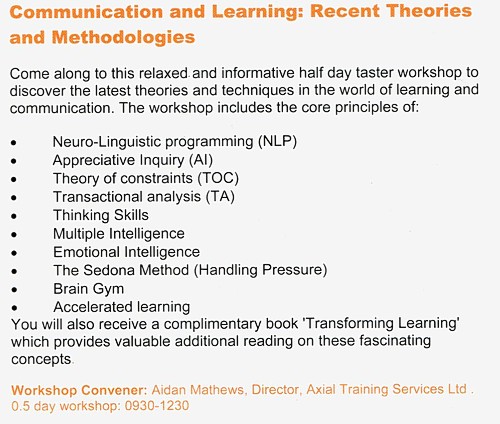
“Self-hypnosis” seems to be nothing more than a pretentious word for relaxation. The person who is teaching researchers to innovate left science straight after his PhD and then did courses in “neurolinguistic programming” and life-coaching (the Carole Caplin of academia perhaps?). How that qualifies him to teach scientists to be innovative in research may not be obvious.
The third course teaches, among other things, the “core principles” of neurolinguistic programming, the Sedona method (“Your key to lasting happiness, success, peace and well-being”), and, wait for it, Brain Gym. This booklet arrived within a day or two of Ben
Goldacre’s spectacular demolition of Brain Gym “Nonsense dressed up as neuroscience”
“Brain Gym is a set of perfectly good fun exercise break ideas for kids, which costs a packet and comes attached to a bizarre and entirely bogus pseudoscientific explanatory framework”
“This ridiculousness comes at very great cost, paid for by you, the taxpayer, in thousands of state schools. It is peddled directly to your children by their credulous and apparently moronic teachers”
And now, it seems, peddled to your researchers by your credulous and
moronic HR department.
Neurolinguistic programming is an equally discredited form of psycho-babble, the dubious status of which was highlighted in a Beyerstein’s 1995 review, from Simon Fraser University.
“ Pop-psychology. The human potential movement and the fringe areas of psychotherapy also harbor a number of other scientifically questionable panaceas. Among these are Scientology, Neurolinguistic Programming, Re-birthing and Primal Scream Therapy which have never provided a scientifically acceptable rationale or evidence to support their therapeutic claims.”
The intellectual standards for many of the training courses that are inflicted on young researchers seem to be roughly on a par with the self-help pages of a downmarket women’s magazine. It is the Norman Vincent Peale approach to education. Uhuh, sorry, not education, but training. Michael O’Donnell defined Education as “Elitist activity. Cost ineffective. Unpopular with Grey Suits . Now largely replaced by Training .”
In the UK most good universities have stayed fairly free of quackery (the exceptions being the sixteen post-1992 universities that give BSc degrees in things like homeopathy). But now it is creeping in though the back door of credulous HR departments. Admittedly UCL Hospitals Trust recently advertised for spiritual healers, but that is the NHS not a university. The job specification form for spiritual healers was, it’s true, a pretty good example of the HR box-ticking mentality. You are in as long as you could tick the box to say that you have a “Full National Federation of Spiritual Healer certificate. or a full Reiki Master qualification, and two years post certificate experience”. To the HR mentality, it doesn’t matter a damn if you have a certificate in balderdash, as long as you have the piece of paper. How would they know the difference?
A lot of the pressure for this sort of nonsense comes, sadly, from a government that is obsessed with measuring the unmeasurable. Again, real management people have already worked this out. The management editor of the Guardian, said
“What happens when bad measures drive out good is strikingly described in an article in the current Economic Journal. Investigating the effects of competition in the NHS, Carol Propper and her colleagues made an extraordinary discovery. Under competition, hospitals improved their patient waiting times. At the same time, the death-rate e emergency heart-attack admissions substantially increased.”
Two new government initiatives provide beautiful examples of the HR mentality in action, They are Skills for Health, and the recently-created Complementary and Natural Healthcare Council.(already dubbed OfQuack).
The purpose of the Natural Healthcare Council .seems to be to implement a box-ticking exercise that will have the effect of giving a government stamp of approval to treatments that don’t work. Polly Toynbee summed it up when she wrote about “ Quackery
and superstition – available soon on the NHS “ . The advertisement for its CEO has already appeared, It says that main function of the new body will be to enhance public protection and confidence in the use of complementary therapists. Shouldn’t it be decreasing confidence in quacks, not increasing it? But, disgracefully, they will pay no attention at all to whether the treatments work. And the advertisement refers you to
the Prince of Wales’ Foundation for Integrated Health for more information (hang on, aren’t we supposed to have a constitutional monarchy?).
Skills for Health, or rather that unofficial branch of government, the Prince of Wales’ Foundation, had been busy making ‘competences’ for distant healing, with a helpful bulletted list.
“This workforce competence is applicable to:
- healing in the presence of the client
- distant healing in contact with the client
- distant healing not in contact with the client”
And they have done the same for homeopathy and its kindred delusions. The one thing they never consider is whether they are writing ‘competences’ in talking gobbledygook. When I phoned them to try to find out who was writing this stuff (they wouldn’t say), I made a passing joke about writing competences in talking to trees. The answer came back, in all seriousness,
“You’d have to talk to LANTRA, the land-based organisation for that”,
“LANTRA which is the sector council for the land-based industries uh, sector, not with us sorry . . . areas such as horticulture etc.”.
Anyone for competences in sense of humour studies?
The “unrepentant capitalist” Luke Johnson, in the FT, said
“I have radically downsized HR in several companies I have run, and business has gone all the better for it.”
Now there’s a thought.
The follow-up
The provost’s newletter for 24th June 2008 could just be a delayed reaction to this piece? For no obvious reason, it starts thus.
“(1) what’s management about?
Human resources often gets a bad name in universities, because as academics we seem to sense instinctively that management isn’t for us. We are autonomous lone scholars who work hours well beyond those expected, inspired more by intellectual curiosity than by objectives and targets. Yet a world-class institution like UCL obviously requires high quality management, a theme that I reflect on whenever I chair the Human Resources Policy Committee, or speak at one of the regular meetings to welcome new staff to UCL. The competition is tough, and resources are scarce, so they need to be efficiently used. The drive for better management isn’t simply a preoccupation of some distant UCL bureaucracy, but an important responsibility for all of us. UCL is a single institution, not a series of fiefdoms; each of us contributes to the academic mission and good management permeates everything we do. I despair at times when quite unnecessary functional breakdowns are brought to my attention, sometimes even leading to proceedings in the Employment Tribunal, when it is clear that early and professional management could have stopped the rot from setting in years before. UCL has long been a leader in providing all newly appointed heads of department with special training in management, and the results have been impressive. There is, to say the least, a close correlation between high performing departments and the quality of their academic leadership. At its best, the ethos of UCL lies in working hard but also in working smart; in understanding that UCL is a world-class institution and not the place for a comfortable existence free from stretch and challenge; yet also a good place for highly-motivated people who are also smart about getting the work-life balance right.”
I don’t know quite what to make of this. Is it really a defence of the Brain Gym mentality?
Of course everyone wants good management. That’s obvious, and we really don’t need a condescending lecture about it. The interesting question is whether we are getting it.
There is nothing one can really object to in this lecture, apart from the stunning post hoc ergo propter hoc fallacy implicit in “UCL has long been a leader in providing all newly appointed heads of department with special training in management, and the results have been impressive.”. That’s worthy of a nutritional therapist.
Before I started writing this response at 08.25 I had already got an email from a talented and hard-working senior postdoc. “Let’s start our beautiful working day with this charging thought of the week:”.
He was obviously rather insulted at the suggestion that it was necessary to lecture academics with words like ” not the place for a comfortable existence free from stretch and challenge; yet also a good place for highly-motivated people who are also smart about getting the work-life balance right.”. I suppose nobody had thought of that until HR wrote it down in a “competence”?
To provoke this sort of reaction in our most talented young scientists could, arguably, be regarded as unfortunate.
I don’t blame the postdoc for feeling a bit insulted by this little homily.
So do I.
Now back to science.
Boots the Chemists have proved themselves dishonest before, over their promotion of homeopathy and of B Vitamins “for vitality”
In a press release dated 12 March 2008, they have hit a new low in ethical standards
| Boots help boost the nation’s energy levels in just one week “Health and beauty expert Boots has launched an exclusive energising vitamin supplement that helps boost depleted energy levels and maintain vitality. It is the first time that this exclusive form of CoQ10 has been made available on the high street.” ” . . .supplementation can help to supply higher levels of CoQ10 than are available in the diet. Boots Energy Super Strength CoQ10 containing natural Kaneka CoQ10 is a way of boosting energy levels that can help people who lack energy to see results in a week” |
You decide.
Last year there was an equally misleading press release about CoQ10 from Solgar/Boots Herbal. That one was headed “Need More Energy – Solgar’s Nutri Nano™ Uses Nanotechnology to Deliver Unprecedented Bioavailability of CoQ10”. Not only is the word ‘energy’ misused but notice that the trendy term ‘nanotechnology’ is worked in for extra sciencey effect. It turns out that all this means is that the preparation contains micelles. So nothing new there either. Micelles have been known for almost 100 years.
In contrast, the Boots online store is noticeably more restrained. Could that be because the Advertising Standards People can’t touch press releases, just as they can’t control what Boots Expert Team tell you face to face in the shop?
Boots PR contact is given as: Carrie Eames, PR Manager, Boots The Chemists, D90W WG14, Thane Road, Nottingham NG90 1BS. I’m not sure how Ms Eames sleeps at night. Perhaps you should write to her and let her know what you think.
You might point out to her Boots (anti) Social Corporate (ir)Responsibility Page. It says
| “So it’s part of our heritage to treat our customers fairly and act with integrity in everything we do, rather than seizing on the quickest and easiest way to turn a profit.” |
CoQ10 and “energy”
Coenzyme Q10 (also known as ubiquinone) is a relatively small molecule. It cooperates with cytochrome enzymes (big proteins) to synthesize a molecule called ATP. This is a chemical form of energy that can be used to do work, such as making a muscle fibre contract.
The word “energy ” here is used in the sense that a physicist would use it. It is measured in joules or in calories. The meaning of the word ‘energy‘ is described nicely in the Wikipedia entry. For example, when an electric current passes through a resistor (like a kettle) the electrical energy is converted to heat energy, and the energy used is potential difference (volts) X current (amps) X time. In other words energy is power (in watts) times time. So another unit for energy is kilowatt-hours (one kilowatt-hour is about 3.6 megajoules).
Energy in this sense has nothing whatsoever to do with the everyday use of ‘energy’ to indicate your vitality, or how lively you feel.
Furthermore there is not the slightest empirical reason to think that CoQ10 makes you feel more lively. None. The press release cites a sciencey-sounding reference (Ernster L, Dallner G. Biochemical, physiological and medical aspects of ubiquinone function. Biochim Biophys Acta. 1995 May 24;1271(1):195-204.). But this paper is just a review of the biochemistry, nothing whatsoever to do with feeling good.
CoQ10 and the supplement business
There is nothing new in this big push by Boots. CoQ10 has been a staple of supplement business for a long time now. All sorts of medical claims have been made for it. Everything from migraine, to Parkinson’s disease to cancer has been raised as possible benefits of the magic drug, oops, I mean ‘supplement’. This is quite improper of course, since it is being sold as a food not as a medicine, but it is standard practice among supplement hucksters, and so far they have been allowed to get away with it.
What’s interesting though is that until Boots PR machine swung into action, one thing that hadn’t been claimed much is that it made you feel more lively. That’s one they just invented.
CoQ10 and the press
It’s standard technique to get free advertising by hoping that journalists will dash off an article on the basis of a press release, with the hope that they will be in too much hurry to check the spin. Too often it works.
The Daily Mail has big coverage of the press release, under the title “Can a 60p pill from the chemist really add years to your life?“. This was written by Anna Hodgekiss and it’s not bad. It starts with a nice note of scepticism
“Forget vitamins C, E or even B12. The real wonder supplement is Coenzyme Q10 or CoQ10. That’s what Boots would have you believe, anyway. ”
“So should we all be taking this supplement?Not according to David Colquhoun, professor of pharmacology at University College London, who says Boots’ claims are “deliberately misleading customers”.
“Yes, CoQ10 helps the body convert glucose into energy, but it’s not the psychological get-up-and-go energy you feel day to day.
“The type of energy it does produce powers our muscles and cells – physical energy. They have confused the two here to promote a product that I’m not convinced would make any difference to how you actually feel at all.”
The article goes on
Among the other sceptics is Scott Marsden, a senior dietician at The London Clinic.
“There haven’t been enough trials to warrant us all taking CoQ10,” he says.
“It sounds boring, but if you are healthy and eating a balanced diet, you will get all the nutrients you need and shouldn’t have to take supplements.
“Not only could you be spending money unnecessarily, you could also be putting your health at risk. Buy some wholesome food instead.” “
Dr Clare Gerada, vice chairman of the Royal College of General Practitioners, is more forthright.
“While there is some evidence to suggest CoQ10 supplements may help patients with heart failure or severe respiratory disorders, more work is needed,” she says.
“This is just another example of normal health being medicalised, and it’s an issue that worries me.
“The human body is an amazing machine, and we have never been in better health. The fact that more people are living well into their 80s and 90s is proof.
“People need to stop looking for a wonder pill in their quest to live for ever.”
But guess who comes out fighting for Boots? None other than my old friend Dr Ann Walker. Little wonder then that my Nutriprofile result recommended a co Q10 supplement, because she is involved in that too.
Ann Walker’s colleague on the Nutriprofile project, Dr Sarah Brewer comments on CoQ10 on the Healthspan site, thus.
“As CoQ10 is vital for energy production in muscle cells, lack of CoQ10 is linked with lack of energy, physical fatigues, muscle aches and pains . . .”
It seems that she also can’t distinguish between energy in joules and energy as vitality,
Female First and Marie Claire also carry a story “Boots Sell ‘Life Extending’ Pill”
“A new pill that claims to add years to our lives is due to hit shelves in Boots stores this week but scientists say the drug is misleading.”
“Despite these claims Professor David Colquhoun told Marie Clare that he believes the drug is ‘deliberately misleading customers’: “Yes, CoQ10 helps the body convert glucose into energy, but it’s not the psychological get-up-and-go energy you feel day to day,” he said.”
(Funny, I never consciously spoke to Marie Claire but the quotation is OK.)
The Times, in contrast, carries an appalling column by their Dr Thomas Stuttaford, “A natural solution to tiredness“. There isn’t even a question mark in the title, and the content is totally uncritical. Private Eye has nicknamed the author ‘Dr Thomas Utterfraud’. How very cruel.
See also, excellent articles on CoQ10 by Ben Goldacre in the Guardian, and at badscience.net, and at Holfordwatch and Dr Aust’s Spleen
Aha Boots have repeated their mendacious claims in newspaper advertisements
This appeared in the Guardian on 18 March, and I’m told it was in the Mail too.

The small print says
“The new Boots Energy supplement contains Kaneka Q10 to help boost your energy levels throughout the day”
Here is what I just sent to the Advertising Standard Authority, or email new.complaints@asa.org.uk . Why not have a go yourself?
| “The words “boost your energy levels” and “still lacking energy” constitute a (presumably deliberate) confusion beteen ‘energy’ measured in joules and the everyday use of the word ‘energy’ to mean vitality. The former usage would be justified in viewof the role of Coenzyme Q10 in ATP production. There is neither theoretical justification nor any empirical evidence that CoQ10 helps your vitality or ‘energy’ in the latter sense.” |
A full size graphic to attach to your complaint can be downloaded here.
We are all interested in the relationship between our health and what we eat. What a pity that so little is known about it.

The problem, of course, is that it almost impossible to do randomised experiments, and quite impossible in most cases to make the experiments blind. Without randomisation there is no way to be sure about causality, and causality is all that matters. All you can do is measure “associations” and that sort of information is simply unreliable.
For example, if you simply observe that people who eat a lot of dark green vegetables are healthier than those who don’t, there is no reliable way to tell whether their health is caused by eating the vegetables. It is just as likely that, for example, rich people are healthier because the are rich, not because they eat more vegetables. The answer, though usually not known, is the only thing that matters for offering advice. The crucial problem is that, in the latter case, it will do no good at all to bully a poor person to eat more vegetables: their health will not improve because their bad health was caused by poverty, not by lack of vegetables.
It is precisely this difficulty that results in the constantly conflicting advice that we are given about diet. I can’t think of any single thing that does more harm to real science than the fact that one week we are told that red wine is bad and the next week we are told that red wine is good. No doubt both statements were based on a naive observational studies, the significance of which is vastly exaggerated by its authors (and often by their university’s media department too).
The first job of a scientist is to be able to say “I don’t know”. Under pressure from the government’s audit culture, and the HR apparatchiks who embrace it so eagerly, all that is forgotten only too easily. he lack of certain answers about diet leaves a vacuum into which not only naive scientists are sucked, but also it is a gift for hucksters who are eager to sell you expensive ‘supplements’, whether or not you need them. As always, it is a case of caveat emptor.
The questions are important to us all, so when sciencepunk pointed out to me a chance to check my own diet, I went for it. I try to keep pretty close to the current guidelines. Unreliable though they may be, they are the best we’ve got. So I went to the Nutriprofile site, and filled in the questionnaire, quite honestly (apart from saying I was 37 -I wish).
I eat plenty of fruit and oily fish every week so I though I’d do quite well. No such luck. I ended up being told I was deficient in iron and selenium, and at “risk of deficiency” in vitamin B5 (pantothenic acid), folate, vitamins D, E, K, magnesium, copper and potassium.
Uhuh, I must really be ill and I’d never realised it.
At the bottom of this analysis of all my deficiencies comes the sales pitch, “your personalised supplement recommendations”.”Strongly recommended” for me is Gold Standard A-Z Multivitamins (just click on the “buy now” button). I’m also “recommended” to buy Omega 3 1000mg capsules.
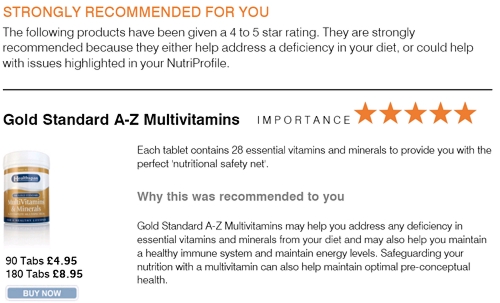
And then I’m invited to consider a whole list of other supplements
“The following products have been given a 1 star rating. This usually means they have been recommended to meet a specific issue raised by your NutriProfile. You should consider these supplements where you feel they could help if the issue is particularly important to you”
Here is the list.
- Selenium + A,C,E,
- Echinacea (“may help you maintain a healthy immune system”).
- OptiFive (antioxidant supplement)
- Co-enzyme Q10 (“may help you maintain energy levels” -look out for a forthcoming post on this scam)
- Memo Plus (“may help you maintain brain health and cognitive function”),
- Panax Ginseng (“may help you to maintain energy levels”
- Psyllium Husks
- Magnesium
- Vitamin D
- Ginkgo Biloba
- Probiotic
As always, there are lots of fantasies about “strengthening the immune system”. And the great antioxidant myth is exploited to the full.
Puzzled by this result, I got my wife to do the questionnaire, and also a particularly healthy and diet conscious colleague.
My wife was recommended to buy Omega 3 1000mg, Osteo Plus Bone health supplement (despite telling them that she already took calcium) and 50 Plus Multivitamins (“may help you address any deficiency in essential vitamins and minerals and may also help you maintain a healthy immune system and maintain energy levels. “). And then it may not.
My spectacularly healthy and diet conscious colleague got a strongly recommended (maximum 5 stars like me) for Gold Standard A-Z Multivitamins and for Omega 3 1000mg, as well as “recommended” for plant sterols, garlic and Opti-Omega 3.
Either I’m a lot unhealthier than I thought, or Nutriprofile is a sales scam.
You decide.
Is there anyone at all who does NOT need supplements?
By this stage I was getting suspicious so I sent the link to a professional dietitian, Catherine Collins of St George’s Hospital London. Unlike the people running the site, she has no financial interest in selling you pills. I asked her to fill in the questionnaire as a hypothetical person who had an ideal diet, based on current nutritional knowledge . Surely such a paragon of dietetic virtue would not need to buy pills too?
Don’t you believe it. At least she didn’t get any 5 star “strongly recommended”, but she did get “Recommended for you” Opti-Omega 3 (3.5 stars) and Gold Standard A-Z Multivitamins (3 stars). Plus, of course the whole list of “you may like to consider”, same as everyone seems to get.
So I asked Collins how it came about that everyone seems to end up being recommended to buy pills after going through all the questions. Here is what she said.
“Apparently my ratio of omega3:6 is unbalanced. not if you ate the amount of oily fish i’d put in, and used ‘vegetable’ oil which is mono-rich rapeseed. I think they’ve used the sunflower analysis to generate this distortion.
I disagree with absolute amounts of omega-3 per day. The amount I recorded meant I would easily exceed a daily intake of 500 mg of the important omega-3 fats, EPA and DHA
Low Vitamin B6 and folate – totally incorrect recommendation based on my entries
Potassium – the survey indicated concern that diet provided 200mg per day less potassium than recommended. This was incorrect, the flaw I assume being due to inability of the questionnaire to handle portion sizes. Should I have been worried even if this had been accurate? Of course not. Potassium is widespread across food groups, the most concentrated being fruit and vegetables. It is an essential nutrient, but its requirements are relative to sodium (‘salt’) intake.
Their omega-3 fat recommendation is double the FSA/ SACN suggestion of 450mg/d – they actually quote this in their supporting information but then say ‘experts say we need double’ [their experts are below]. This is highly misleading. We need a combination of omega-3 fats in our diet for health – not only the ‘fishy’ EPA and DHA, but also the readily available ALA, found in vegetable (rapeseed) oil
Omega 3:6 ratio -completely wrong based on the foods entered. Demonstrates a major flaws in the assumptions made about type and amount of foods in the diet.
Water recommendations. Totally inaccurate information based on the myth expounded by the health food industry and its workers that caffeine is a diuretic. This been extensively researched and proven to be not true ( Grandjeans excellent work). The only way in which a caffeinated beverage is ‘diuretic’ to someone who takes caffeinated drinks regularly is in the volume of drink consumed.
She concludes
“”This appears an elaborate pill-pushing exercise. Superficially reassuring in promoting the recognised FSA (Food Standards Agency] line – but then giving undue – and unjustifiable – support to the anecdotal ‘experts recommend’ to create what will be a powerful sell”
The comment about water intake stems from this bit of Collins’ Nutriprofile:
“Caffeinated drinks, fizzy drinks and alcohol do not count because, whilst they contain water, they are mild diuretics, ie. they boost urine output and therefore should only form a small part of your total fluid intake.”
This myth (aka nutribollocks) is quite contrary to what the real research (going back to 1928) says, Check “Laying the caffeine myth to rest” for the real story..
I’m told that Healthspan are now sending out the paper questionnaire in newspapers. Presumably this is to ensure that the poor, the elderly etc and others who that aren’t computer literate don’t miss their buying opportunity. How considerate of them.
Nutriprofile’s expert team
Who is the expert team behind Nutriprofile? Here they are.
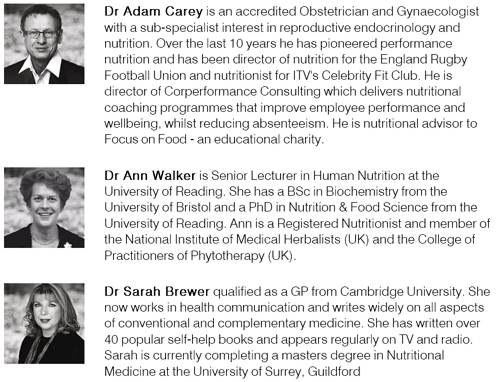
 |
 |
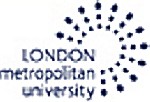 |
What do the real experts say about supplements?
The story you get is quite different when you ask somebody who is not trying to sell you something
The Food Standards Agency says
“Most people should be able to get all the nutrients they need by eating a varied and balanced diet. But if you choose to take supplements, it’s important to know that taking too much or taking them for too long can cause harmful effects.”
Harvard Men’s Health Watch says
“Harvard Men’s Health Watch suggests that the average man give up the multivitamin, at least until scientists solve the puzzle of folic acid and cancer.”
“If you eat a balanced diet that includes food from all the major groups, there should be no need to take vitamin supplements. The food you eat will provide you with all the vitamins and minerals you need. “
I guess we should not be surprised at the direct contradiction between this advice and that of the Nutriprofile questionnaire. After all, Nutriprofile was developed by a company, Healthspan, that is devoted to selling “supplements” with all the dubious claims and customer testimonials associated with the alternative health industry.
But this is what always happens when big business controls science.
Postscript
Oddly enough, Ann Walker’s experience seems to be much the same as ours. In an interview on the Healthspan site we read this.
Q: Which nutritional supplements do you choose to take?
A: I regularly take a multivitamin, vitamins C and E, fish oil, and a calcium and magnesium combination. I also take vitamin D during the winter and some herbs as and when they are needed.
Even if I have improved my diet, each time I complete the NutriProfile questionnaire my requirement for a multivitamin, calcium and magnesium, and a fish oil supplement are always thrown up.
Didn’t it occur to her to wonder why?
The sales pitch was followed up on 27 March the email arrived from Healthspan “Healthspan are offering you £5 to spend towards your recommended supplements”. One can’t say whether this offer goes to people who were not recommended supplements, because so far no such person has been found.
This is the third post based on a recent trip to North America (here are the first and second)
One aspect of the endarkenment, the Wal-Mart model of a university, is very much the same in the US as in the UK. At one US university, an excellent scientist offered the theory that an alien spacecraft had scattered spores across the land which developed into HR staff who appeared at first sight to be human, and who colonised academia.
The penetration of quackademics into US universities is a bit different from in the UK.
In the UK, the plague is restricted to sixteen or so ex-polytechnic universities which, to their great shame, actually offer Bachelor of Science degress in subjects like homeopathy. There are bits of quackery in good teaching hospitals (such as laying-on-of-hands at UCLH), but not very much.
In the USA and Canada, this sort of “vocational” training does not occur much in universities, but in separate colleges. The situation is worse there though, insofar as these colleges have been allowed to award titles like ‘doctor of naturopathic medicine (ND)’, for work that in no respect compares with what the rest of the world has to do to earn a doctorate. This prostitution of academic titles has not happened to anything like the same extent in the UK. How our own quacks would love it if they were allowed to call themselves ‘doctor’ and sport the initials ND (so easily mistaken for MD at first sight).
It is on the clinical side where the situation is far worse than in the UK. Almost every university hospital, including Harvard, Yale and Stanford, has departments devoted to fairy-tale medicine.
Quacks use a number of euphemisms to make themselves sound more respectable. First they became ‘alternative medicine’, then ‘complementary medicine’. Now the most-used euphemism is ‘integrative medicine’, which is favoured by most US universities (as well as by the Prince of Wales). Raymond Tallis pointed out that this seems to mean integration of treatments that don’t work with treatments that do work.
An official roll of shame for North American universities can be seen here (35 in USA and 4 in Canada). 
A bigger collection of 44 universities has been posted by the incomparable Orac at the The Academic Woo Aggregator. He’s had good support in the USA from DrRW (R.W. Donnell), see particularly his articles on How did pseudoscience get admitted to medical school? and What is happening to our medical schools? Abraham Flexner is turning over in his grave.
All these outfits have two things in common. They all claim to be scientific and evidence-based, and none has produced any real evidence that any of their treatments work.
Here are a few examples of what’s going on.
Yale University School of Medicine

The usual theme is expressed thus.
“Through open-minded exploration and rigorous scientific inquiry, we aim to improve awareness and access to the best in evidence-based, comprehensive medical care available worldwide, with the goal of optimizing health and healing for patients”
The driving force behind the woo seems to be a fourth year medical student, Rachel Friedman, so I wrote to her to ask what useful alternative treatments had been established by research at Yale. But she could not identify any. All I got was this.
“My best advice would be to do some medline searching of metaanalyses” there’s been enough research into some of these modalities to provide for a metaanalysis.”
So she was unable to produce nothing (and anyway. metanalyses, useful though they may be, are not research).. A glance at the Yale publications page shows why.
The Scripps Institute
![]()
Scripps Center for Integrative Medicine says
“In use at Scripps since 1993, Healing Touch is an energy-based, non-invasive treatment that restores and balances energy to help decrease pain and relieve associated anxiety.
Healing Touch is performed by registered nurses who recognize, manipulate and balance the electromagnetic fields surrounding the human body, thereby promoting healing and the well-being of body, mind and spirit.”
“Balances energy”?
“manipulate and balance the electromagnetic fields surrounding the human body”?
This is just meaningless baloney. And it come from the Scripps Institute.
The Oregon Health & Science University
![]()
![]()
OHSU is an excellent and well-respected research university where I have many friends. It was a pleasure to meet them recently.
But it also has a big department of “Complementary and alternative medicine” and an “Integrated medicine service”. There are some good bits of advice mixed up with a whole range of crazy stuff. Take their page on homeopathy.
“This therapy treats ailments with very small amounts of the same substance that causes the patient’s symptoms.”
WRONG. In most cases it is zero amount. To brush this fact under the carpet is simply dishonest (and perhaps a sign of guilt). Then comes this (my emphasis)..
Explanations for why homeopathy works range from the idea that homeopathic medicine stimulates the body’s own natural defenses to the idea that homeopathic medicine retains a “memory” of the original substance.
However, there is no factual explanation for why homeopathy works and more research is needed.”
WRONG. This statement carries (twice) the expicit message that homeopathy does work, quite contrary to a mountain of good evidence that it is merely a placebo. The statement is deceptive and dishonest. And it comes with the OHSU logo.
The University of Arizona

” Heal medicine”, “Transform the world?” Modest uh?
The University of Arizona Program in Integrative Medicine is certainly not modest in its claims, but its publications page shows that it doesn’t even attempt to find out if its “therapies” actually work.
Here is an example. They are advertising their Nutrition and Health conference
heavily.

There’s nothing wrong with good nutrition of course, but the ‘alternative’ approach is instantly revealed by the heavy reliance on the great antioxidant myth.
And look at the sponsors. The logo at the top is for Pistachio Health, a company that promotes pistachio nuts: “Delicious and good-for-you, pistachios are nature’s super heart-healthy snack. Nutrient dense, full of fiber and antioxidants, pistachios give you more bang per calories than any other nut.”.
The other advertisement is ‘POM Wonderful’, a company that sells and promotes pomegranate juice, “POM is the only pomegranate juice you can trust for real pomegranate health benefits”
No doubt pistachio nuts and pomegranate juice are perfectly good foods. But the health claims made for them are just marketing and have very little basis in fact.
Now let’s look at the speakers. Take, for example, Dr David Heber, MD., PhD. He is director of the UCLA Center for Human Nutrition at the University of California, Los Angeles, a professor of Medicine and Public Health, and the founding Chief of the Division of Clinical Nutrition in the Department of Medicine. He is the author of several books including “What Color is Your Diet” and the “L.A. Shape Diet.” With the possible exception of the books, you can’t sound like a more respectable and impartial source of advice than that.
But hang on. Dr Heber is to be seen in a video on the Pistachio Health web site doing what amounts to a commercial for pistachio nuts.
OK let’s take a look at one of Dr Heber’s papers. Here’s one about, guess what, pomegranate juice. “Pomegranate Juice Ellagitannin Metabolites Are Present in Human Plasma and Some Persist in Urine for Up to 48 Hours”. The work was “Supported by the Stewart and Lynda Resnick Revocable Trust and from the NIH/NCI grant P50AT00151”. So no problems there. Well not until you check POM Wonderful in Wikipedia, where you find out that Stewart and Lynda Resnick just happen to be founders of POM.
Of course none of these interesting facts proves that there is anything wrong with the work. But they certainly do show that the alternative nutrition business is at least as much hand-in-glove with big business as any other form of medicine. And we know the problems that that has caused.
So, if you want impartial advice on nutrition, sign up for the 6th Annual Nutrition and Health meeting. For “MD, DO, ND & other doctors”, it will cost you only $845 to register .
The meeting is being run by The University of Arizona College of Medicine and Columbia University’s College of Physicians and Surgeons.

![]()
The University of Arizona is, incidentally, also the home of the famous (or perhaps infamous) Gary Schwartz (see also, here). He “photographs” non-existent “energy fields” and claims to be able to communicate with the dead, and he is director of its Human Energy Systems Laboratory at the University of Arizona. He is also head of the inappropriately-named Veritas Research Program and “Centre for Frontier Medicine in Biofield Science”. All of these activities make homeopathy look sane, but he is nevertheless part of an otherwise respectable university. In fact he is He is Gary E. Schwartz, Ph.D. is professor of psychology, medicine, neurology, psychiatry and surgery at the University of Arizona. Even more incredibly, this gets NIH funding.
Columbia University, along with Cornell, also has its own “Complementary, alternative, and integrative medicine“, defined as “the use of treatments, such as homeopathic medicine, ayurveda, botanical dietary supplements”. And their “Integrative Therapies Program for Children” is intimately tied up with a company called Origins, which is more a cosmetics company, Origins” (with all the mendacity that implies). They say
“Origins understands the importance of addressing wellness through an integrative approach,” says Daria Myers, President of Origins Natural Resources. “With our recent Dr. Andrew Weil collaboration, Origins demonstrated its support for the integrative wellness concept. Now, with the introduction of the new Nourishing oil for body and massage, we hope to bring not only a moment of comfort but also a healthy future to children enduring the fight of their life.”
Andrew Weil is, of course, the promoter of the Arizona meeting.
The corruption of Universities by this sort of activity is truly amazing.

